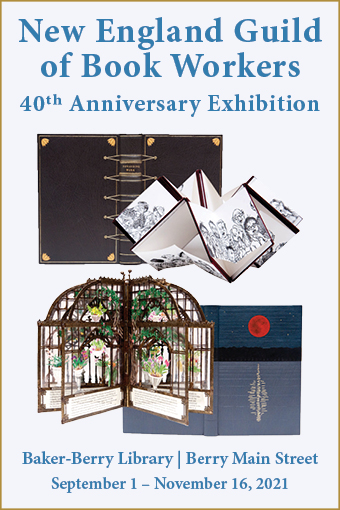Baker-Berry: Past Exhibits
Saving Winter: New Hampshire Skiing in the Era of Climate Change
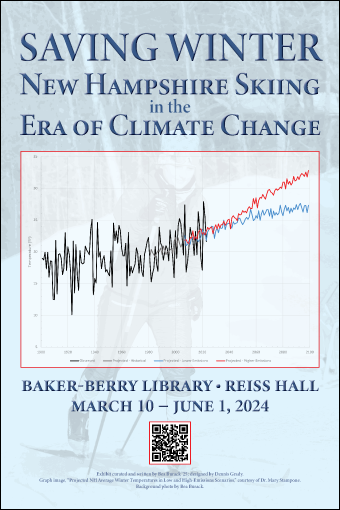
In New Hampshire, the winter ski industry provides roughly 10,000 jobs, $500 million in yearly economic output, and forms an unmistakable part of the state's identity. Researchers estimate a loss of over $50 million in yearly revenue during recent lower-snow winters. Due to climate change, winters are warming and snowfall is decreasing in NH, portending more such winters to come. If climate change continues as usual without major actions to reduce global greenhouse gas emissions, the state is projected to see roughly 40 percent less snowfall, 60 percent fewer days of deep snow cover, and a 20 to 50 percent reduction in days cold enough for ski areas to make snow by the end of the century.
This exhibit and accompanying article series look at what warming winters mean for NH's culture, economy, and environment, and particularly at how skiers and the ski industry are responding to the changing climate. Learn more by following the links below to read the accompanying articles.
Case 2: A Century of Skiing in New Hampshire
Case 3: Snowmaking is a Matter of Survival for Southern New Hampshire Ski Areas
Case 4: Variable Weather and Low Snowfall Force Nordic Skiers onto Shorter Trails
Case 5: When Natural Snow is Hard to Find, Uphill Skiing Moves to Resorts
Case 6: Two Futures for New Hampshire Climate and Skiing
Exhibit curated and written by Bea Burack '25; designed by Dennis Grady.
Baker-Berry Library, Reiss Hall, March 10 – June 1, 2024
Animal Architecture
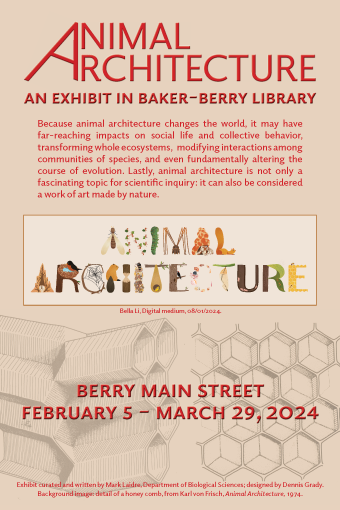
Because animal architecture changes the world, it may have far-reaching impacts on social life and collective behavior, transforming whole ecosystems, modifying interactions among communities of species, and even fundamentally altering the course of evolution. Lastly, animal architecture is not only a fascinating topic for scientific inquiry: it can also be considered a work of art made by nature.
Exhibit curated and written by Mark Laidre, Department of Biological Sciences; designed by Dennis Grady.
Read about Mark's research and the exhibit on the Faculty of Arts and Sciences news page: Coconut Crabs And Other 'Animal Architects'.
"Animal Architecture" illustration created by Bella Li.
Baker-Berry Library, Berry Main Street, February 5 – March 29, 2024
The White Mountains from a Hiker's Point of View
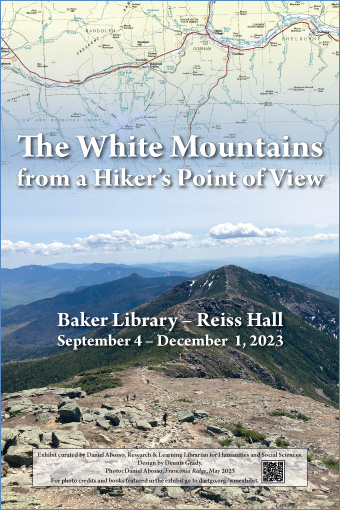
Every year, thousands of hikers hike on more than 500 trails that cover over 1,400 miles in the White Mountains. As the tallest mountains in New England, the White Mountains have long appealed to people, from the Paleoindians and Abenaki who lived in the fertile mountain valleys long before Europeans arrived, to the farmers, tourists, hoteliers, and lumbermen of the 19th and 20th centuries. The rich ecological history is equally matched by the rich human history.
No longer the wild, untamed wilderness that attracted artists and tourists in the 19th century, the White Mountains are now surrounded by civilization. Roads are never very far from the hikers on White Mountains trails. Yet, within 20 minutes of hiking, the sounds of cars give way to the rustling of trees in the wind and the crunch of boots on the trail. This combination of proximity and remoteness makes hiking in the White Mountains an experience accessible to millions of people within a day's drive of the region.
Many hikers focus on the crown jewels of the Whites, such as the Presidential Range, known for its above-treeline hiking and striking views. Still, other hikers seek the solitude of the more remote mountains, while a few hardy souls forgo trails altogether to bushwhack wherever they please. This diversity in pursuits highlights the allure of the White Mountains, offering something for every hiker.
The White Mountains offer a landscape of wilderness and civilization, adventure and connection to the vast tapestry of time. These are the White Mountains from a hiker's point of view.
Exhibit curated by Daniel Abosso, Research & Learning Librarian for Humanities and Social Sciences; designed by Dennis Grady.
Baker-Berry Library, Reiss Hall, September 4 – December 1, 2023
Faded Glory: The Decline in American Exceptionalism
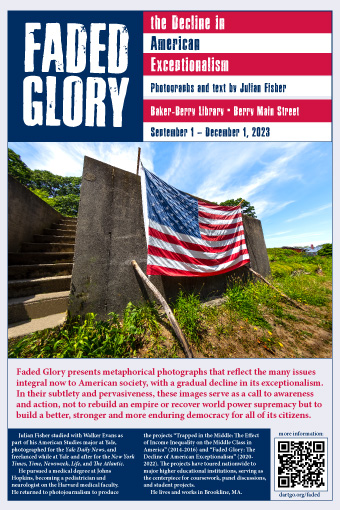
"Faded Glory" presents metaphorical photographs that reflect the many issues integral now to American society, with a gradual decline in its exceptionalism. In their subtlety and pervasiveness, these images serve as a call to awareness and action, not to rebuild an empire or recover world power supremacy but to build a better, stronger, and more enduring democracy for all of its citizens.
Photographs and text by Julian Fisher. Exhibit design by Dennis Grady.
Julian Fisher studied with Walker Evans as part of his American Studies major at Yale, photographed for the Yale Daily News, and freelanced while at Yale and after for the New York Times, Time, Newsweek, Life, and The Atlantic.
He pursued a medical degree at Johns Hopkins, becoming a pediatrician and neurologist on the Harvard medical faculty. He returned to photojournalism to produce the projects "Trapped in the Middle: The Effect of Income Inequality on the Middle Class in America" (2014-2016) and "Faded Glory: The Decline of American Exceptionalism" (2020-2022). The projects have toured nationwide to major higher educational institutions, serving as the centerpiece for coursework, panel discussions, and student projects.
He lives and works in Brookline, MA.
Baker-Berry Library, Berry Main Street, September 8 – December 1, 2023
CHILE 1973–2023: Between the Pinochet Machine & Thousands of Imagined Nations
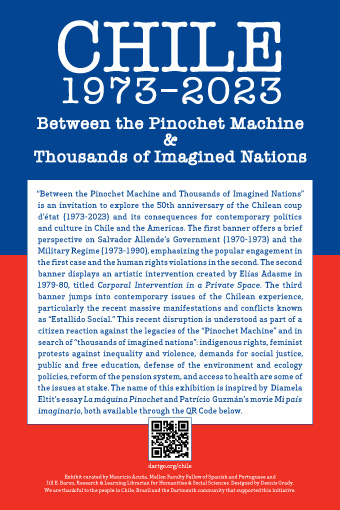
"Between the Pinochet Machine and Thousands of Imagined Nations" is an invitation to explore the 50th anniversary of the Chilean coup d'état and its consequences for contemporary politics and culture in Chile and the Americas.
The first banner offers a brief perspective on Salvador Allende's Government (1970-1973) and the Military Regime (1973-1990), emphasizing the popular engagement in the first case and the human rights violations in the second.
The second banner displays an artistic intervention created by Elías Adasme in 1979-80, titled Corporal Intervention in a Private Space.
The third banner jumps into contemporary issues of the Chilean experience, particularly the recent massive manifestations and conflicts known as "Estallido Social." This recent disruption is understood as part of a citizen reaction against the legacies of the "Pinochet Machine" and in search of "thousands of imagined nations": indigenous rights, feminist protests against inequality and violence, demands for social justice, public and free education, defense of the environment and ecology policies, reform of the pension system, and access to health are some of the issues at stake.
The name of this exhibition is inspired by Diamela Eltit's essay La máquina Pinochet and Patrício Guzmán's movie Mi país imaginario.
Exhibit curated by Mauricio Acuña, Mellon Faculty Fellow of Spanish and Portuguese, and Jill E. Baron, Research & Learning Librarian for Humanities & Social Sciences. Designed by Dennis Grady.
We are thankful to the people in Chile, Brazil, and the Dartmouth community who supported this initiative.
To learn more about this period in Chile’s history, please refer to our research guide for books, articles, and films at dartgo.org/chile.
Baker-Berry Library, Brickway Gallery, September 1 – 30, 2023
Ukrainian Folk Art Traditions
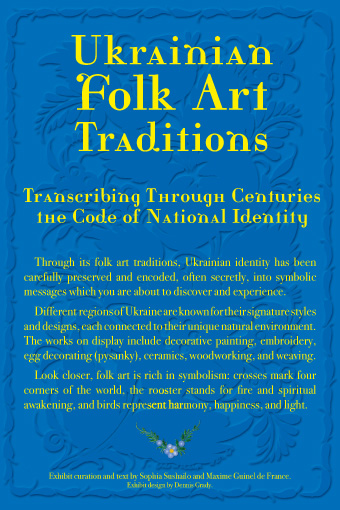
Transcribing Through Centuries the Code of National Identity
Through its folk art traditions, Ukrainian identity has been carefully preserved and encoded, often secretly, into symbolic messages which you are about to discover and experience.
Different regions of Ukraine are known for their signature styles and designs, each connected to their unique natural environment. The works on display include decorative painting, embroidery, egg decorating (pysanky), ceramics, woodworking, and weaving.
Look closer, folk art is rich in symbolism: crosses mark four corners of the world, the rooster stands for fire and spiritual awakening, and birds represent harmony, happiness, and light.
This exhibit features selections from the collection of exhibit curators Sophia Sushailo and Maxime Guinel de France. Exhibit designed by Dennis Grady.
Baker-Berry Library, Berry Main Street, May 23 – August 10, 2023
The Student Library Service Bookplate Program: Class of 2023
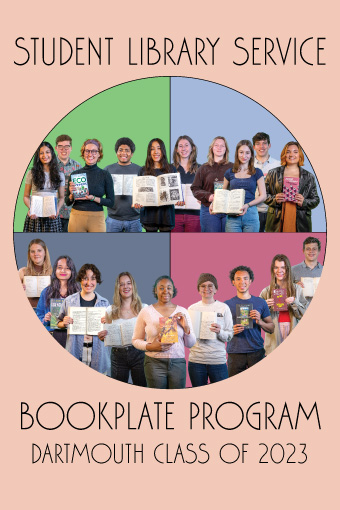
The Student Library Service Bookplate Program honors the Library's graduating student employees by inviting them to choose books and other items for the Library's collections. Each item receives a bookplate that acknowledges the student's selection and honors their service to the Library. Students are eligible if they worked at least two terms in any Library department, including the Writing Center (RWIT).
The Library is honoring forty-four students from the class of 2023 with selections ranging from fiction, non-fiction, poetry, inspirational works, historical scholarship, and favorite reference titles.
Exhibit curated and designed by Dennis Grady, Library Teaching & Learning.
Many thanks to the students who volunteered to participate in this exhibit, and to: Richard Langdell, Library Services Specialist; and Lori Heath, Acquisitions Assistant.
Photography by Khonzumthetho Masuku, Jones Memorial Digital Media Fellow.
Baker-Berry Library, Reiss Hall, May 12 – August 10, 2023
Ernst Haeckel's Artforms in Nature - A Collections Showcase Exhibit
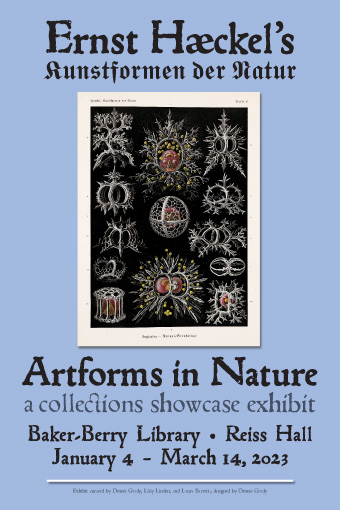
Curators' Statements:
My first encounter with Ernst Hæckel's amazing illustrations of single-celled radiolarians was during a YouTube lecture delivered in 2019 by Rupert Sheldrake at the International Conference on the Physics, Chemistry, and Biology of Water, in Bad Soden, Germany. Sheldrake's talk, "Dynamic Patterns in Water as Analogue Models" used a page from one of Hæckel's volumes on radiolarians to illustrate the point that "Biological morphogenesis is very largely vibration-based, electrical or acoustic vibrations; and ... morphogenetic fields are fields of vibration."
Intrigued by Hæckel's ornate aesthetic skill, I searched the Dartmouth Library catalog for more. My first find was Hæckel's 1924 edition of Kunstformen der Natur, and my first thought was that these exquisite plates would make a beautiful exhibit in Baker Library's Reiss Hall. It was while designing the exhibit and researching Hæckel that the controversies surrounding his methods, his speculative anthropology, and his influence on the development of 20th-century ideologies came to the fore. So then the question came up: Can we show Hæckel's work and celebrate his aesthetic achievements despite the negatives? My co-curator, Lilly Linden, sought advice from members of Dartmouth's scientific community, and we have taken their concerns into account. We present here an opportunity to be amazed by Hæckel's draftsmanship and design while considering the flaws in his methods and the dangers of speculative theory.
—Dennis Grady, Baker-Berry exhibits designer
I had the good fortune of running into Dennis Grady on my first day of work at Dartmouth (Feb 21st, 2022). He mentioned an exhibit about Haeckel's illustrations in the pipeline after he learned of my prior career as a Biologist. Laura Barrett, Dennis, and I touched base and decided that we would reach out to the Ecology, Evolution, Environment and Society (EEES) group at Dartmouth to hear and learn more about Haeckel's influence. While we were aware of some problems around Haeckel's work, none of us realized the true extent of it. With feedback and resources from faculty, postdocs, and graduate students from the Biology and Anthropology departments at Dartmouth, we redesigned the exhibit to bring to the Dartmouth community an exploration of exquisite illustrations from a man who continues to be an integral part of the story of evolutionary biology, albeit colored by his racist ideologies.
We are repeatedly faced with disappointing instances of discovering problematic ideologies supported by researchers of the past. As a community, we can engage with these tensions to situate the role that such individuals play in our scholarship.
—Lilly Linden, Research and Learning Librarian - STEM
A research guide has been provided to accompany the exhibit. Each panel of the exhibit asks the viewers to reflect on different aspects of Haeckel's work.
Baker-Berry Library, Reiss Hall, January 2 – March 14, 2023
Welcome, Dartmouth Class of 2026!
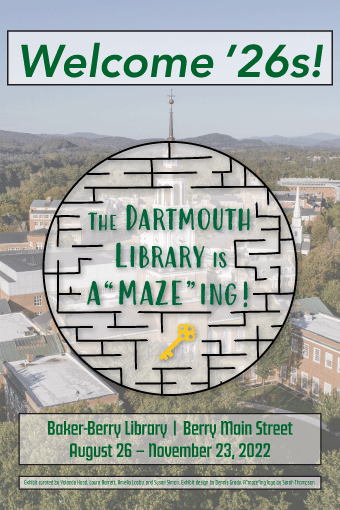
Dartmouth Library welcomes the Class of 2026 with an exhibit highlighting Library resources.
Visit the Library's Canvas site for 1st years.
Exhibit curated by Yolanda Hood, Laura Barrett, Amelia Looby, and Susan Simon. Designed by Dennis Grady. A-maze-ing logo by Sarah Thompson.
Baker-Berry Library, Berry Main Street, August 26 – November 23, 2022
Fifty Years of Coeducation @ Dartmouth - Resistance, Persistence, and Empowerment
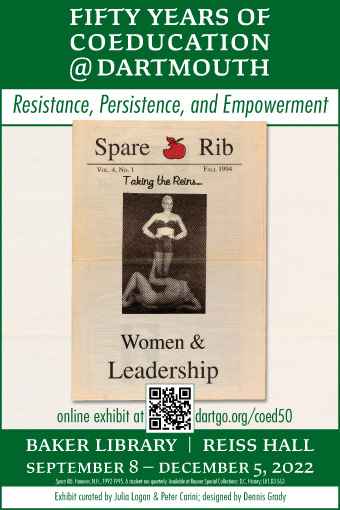
This exhibit marks the 50th anniversary of coeducation at Dartmouth, the most momentous change the institution has ever seen in its history. The exhibit explores the lead-up to that decision, the experiences of the first women students at Dartmouth, and the ways campus life and traditions have evolved in the half-century since then. This long and contentious story of coeducation at Dartmouth is told through primary source documents, including photographs, newspaper articles, student performances, flyers, and pamphlets.
Please visit the digital version of this exhibit, which includes more extensive documentation.
Exhibit curated by Peter Carini, College Archivist and Records Manager, and Julia Logan, Assistant Archivist for Acquisitions. Design by Dennis Grady. Digital exhibit by August Guszkowski, Edward Connery Lathem '51 Digital Library Fellow.
Baker-Berry Library, Reiss Hall, September 8 – December 5, 2022
This exhibit contains material that may be difficult or harmful to view. Please read Dartmouth Library's Statement on Potentially Harmful Content.
Blacks @ Dartmouth, 1828 to 1960 - Celebrating a Legacy on the 50th Anniversary of the Black Alumni of Dartmouth Association
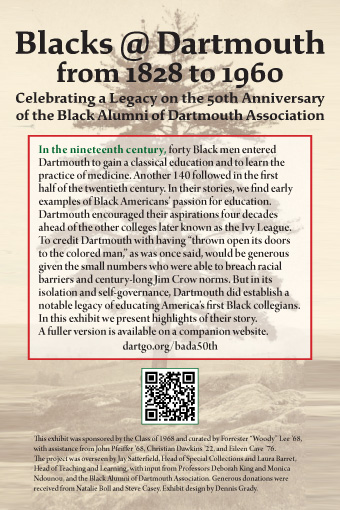
In the nineteenth century, forty Black men entered Dartmouth to gain a classical education and to learn the practice of medicine. Another 140 followed in the first half of the twentieth century. In their stories, we find early examples of Black Americans’ passion for education. Dartmouth encouraged their aspirations four decades ahead of the other colleges later known as the Ivy League. To credit Dartmouth with having “thrown open its doors to the colored man,” as was once said, would be generous given the small numbers who were able to breach racial barriers and century-long Jim Crow norms. But in its isolation and self-governance, Dartmouth did establish a notable legacy of educating America’s first Black collegians. In this exhibit, we present highlights of their story. A fuller version is available on a companion website.
Be sure to visit the companion exhibition, Finding Community: The Life of Edward Mitchell 1828 in Rauner Special Collections Library's Class of 1965 Galleries from April 8, 2022, until June 17, 2022.
This exhibit was sponsored by the Class of 1968 and curated by Forrester “Woody” Lee ’68, with assistance from John Pfeiffer ’68, Christian Dawkins ’22, and Eileen Cave ’76. The project was overseen by Jay Satterfield, Head of Special Collections and Laura Barret, Head of Teaching and Learning, with input from Professors Deborah King and Monica Ndounou, and the Black Alumni of Dartmouth Association. Generous donations were received from Natalie Boll and Steve Casey. Exhibit design by Dennis Grady.
Baker-Berry Library, Reiss Hall, April 25 – August 16, 2022
The Student Library Service Bookplate Program: Class of 2022
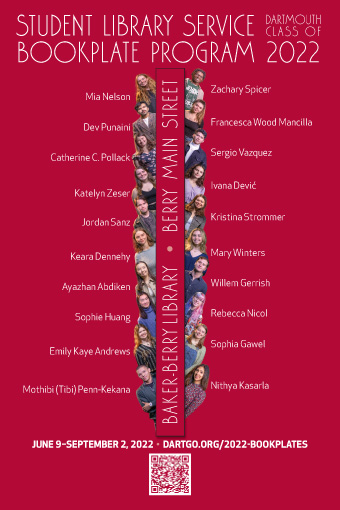
The Student Library Service Bookplate Program honors the Library’s graduating student employees by inviting them to choose books and other items for the Library’s collections. Each item receives a bookplate that acknowledges the student’s selection and honors their service to the Library. Students are eligible if they worked at least two terms in any Library department (including RWIT: Dartmouth’s peer writing center).
The Library is honoring forty-five students from the class of 2022 with selections ranging from fiction, non-fiction, poetry, inspirational works, historical scholarship, and favorite reference titles.
An online exhibit features the twenty-one students who volunteered to participate in the annual exhibit.
Curated and designed by Dennis Grady. Photography by Jackson Cashman.
Baker-Berry Library, Berry Main Street, June 9 – September 2, 2022
File Under Easy Listening
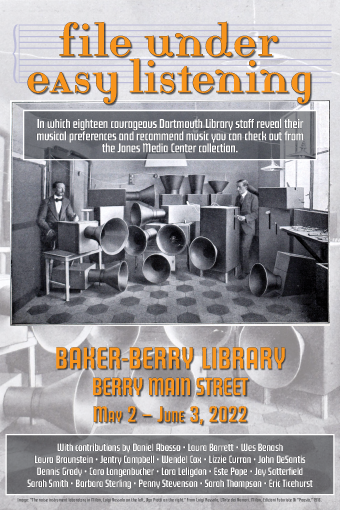
file under easy listening is an exhibit in which eighteen courageous Dartmouth Library staff reveal their musical preferences and recommend music you can check out from the Jones Media Center collection.
With contributions from Daniel Abosso, Laura Barrett, Wes Benash, Laura Braunstein, Jentry Campbell, Wendel Cox, Lizzie Curran, John DeSantis, Dennis Grady, Caro Langenbucher, Lora Leligdon, Este Pope, Jay Satterfield, Sarah Smith, Barbara Sterling, Penny Stevenson, Sarah Thompson, and Eric Ticehurst.
Curated and designed by Dennis Grady.
Baker-Berry Library, Berry Main Street, May 2 – June 3, 2022
Poster image: “The noise instrument laboratory in Milan, Luigi Russolo on the left, Ugo Piatti on the right.” From Luigi Russolo, L’Arte dei Rumori. Milan, Edizioni Futuriste Di “Poesia,” 1916.
Winter 2022 Montgomery Fellows: A Celebration of Making
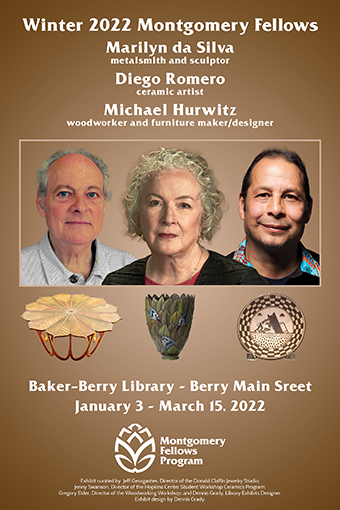
"The question of what a good job looks like—of what sort of work is both secure and worthy of being honored—is more open now than it has been for a long time. Wall Street in particular has lost its luster as a destination for smart and ambitious young people. Out of the current confusion of ideals and confounding of career hopes, a calm recognition may yet emerge that productive labor is the foundation of all prosperity."
—Matthew B. Crawford, Shop Class as Soulcraft: An Inquiry into the Value of Work
Though published in 2009, Crawford's words ring just as true in the winter of 2022. The Montgomery Fellows Program invites you to look at the productive labor of three remarkable craftspeople and discover within their work—and within yourselves—a sense that shaping a world with one's hands brings value and purpose to all our lives.
This exhibit is offered in conjunction with the Montgomery Fellows Program winter term series, bringing metalsmith and sculptor Marilyn da Silva, ceramicist Diego Romero, and woodworker and furniture maker/designer Michael Hurwitz to Dartmouth for public lectures and interactions with the Hopkins Center Student Workshops.
For details visit The Montgomery Fellows website.
Exhibit curated by Jenny Swanson (director, Dartmouth’s ceramics workshop), Jeff Georgantes (director, Dartmouth’s jewelry workshop), Greg Elder (director, Dartmouth’s woodworking workshop), and Dennis Grady (Baker-Berry Exhibits designer). Designed by Dennis Grady.
Baker-Berry Library, Berry Main Street, January 3 – March 15, 2022
Welcome '25s!
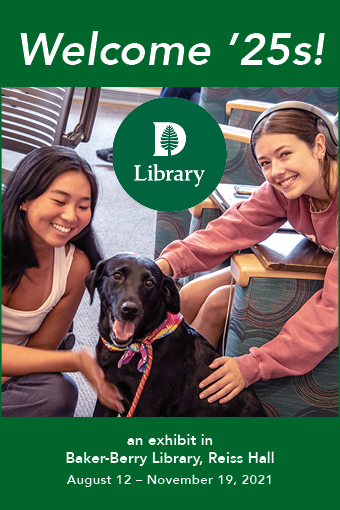
Dartmouth Library welcomes the Class of 2025 with an exhibit highlighting Library resources.
Visit the Library's Canvas site for 1st years.
Exhibit curated by Laura Barrett, Amelia Looby, and Susan Simon. Designed by Dennis Grady.
Photo with Ivy the Lab-rarian by Tom Remp.
Baker-Berry Library, Reiss Hall, August 12 - November 19, 2021
New England Guild of Book Workers 40th Anniversary Exhibition
The Guild of Book Workers is a national organization founded in 1906 that brings together people involved in all the book arts. The New England Chapter, one of ten regional chapters with 180 members, organizes programs within the region, such as lectures, workshops, and exhibitions.
This exhibition marks the 40th Anniversary of the New England Chapter highlighting the creative range and skills of the current members. The work bridges traditional fine binding to innovative design binding where book forms are re-imagined using unconventional materials in new experimental ways.
See the online catalog of the exhibit.
Exhibit design & installation by Deborah Howe, Lizzie Curran, and Lucy Dunphy Barsness. Graphics by Dennis Grady.
Baker-Berry Library, Berry Main Street September 1 - November 16, 2021
Dartmouth Black Legacy Month - 2021
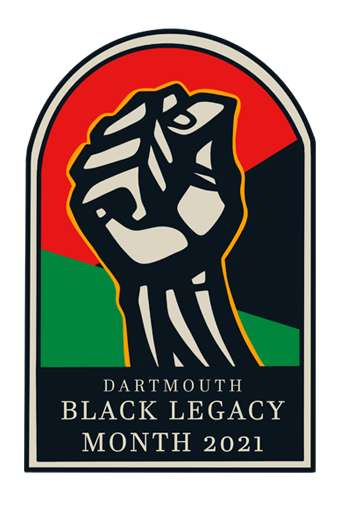 A Brickway Gallery exhibit
A Brickway Gallery exhibit
Black Legacy Month (BLM) is the celebration and recognition of Black culture at Dartmouth College, through a month-long series of events dedicated to the education, awareness, and commemoration of Black heritage and people.
This year, we are highlighting the excellence of Black student leaders at Dartmouth. The eight leaders featured are scholars, activists, and creatives, who are change agents in every aspect of campus life. They have been steadfast in their commitment to advocating for and uplifting the Black community, and their work has transformed Dartmouth College for all students. These leaders are inspiring examples of Excellence at Dartmouth!
- Awo Adu ’22
- Miles ‘Mac’ Battle ’21
- Marina Cepeda ’21
- Laura Logan ’22
- Maya Perkins ’20
- Ian Neville Scott ’24
- Ana Sumbo ’22
- Vitallia D. Williams ’22
Full BLM 2021 schedule of events
Baker-Berry Library, Brickway Gallery, February 1-28, 2021
A Boston Brahmin Abroad: George Ticknor, Hispanism, & Dartmouth
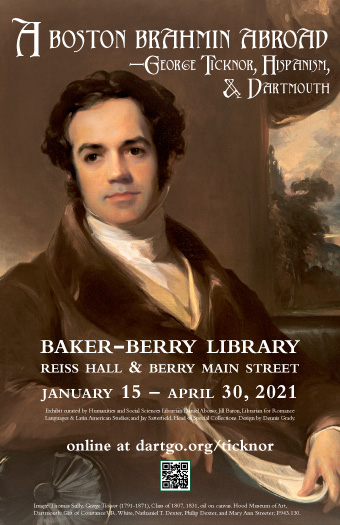 A Boston Brahmin Abroad online exhibit starts on January 25.
A Boston Brahmin Abroad online exhibit starts on January 25.
George Ticknor, Dartmouth Class of 1807, embodied the nineteenth-century concept of a "gentleman of letters." After Dartmouth, he studied law, then moved into his real love, language and literature. He became the first professor of modern languages at Harvard and revolutionized the teaching of modern languages and literatures in the United States.
He traveled extensively in Europe, first in 1815-19 to complete his education, again in the mid-1830s with his wife Anna Eliot Ticknor, and a final trip in the 1850s. Empowered by Anna's considerable fortune, the two traveled in style. They revelled in the history and culture of Europe while being suspicious of the entrenched political and social powers that held sway. They were, after all, Americans, and thoroughly invested in the great experiment of a democratic republic.
Perhaps most famous for authoring the first history of Spanish literature and being one of the original organizers of the Boston Public Library, he, along with Anna, maintained an active literary salon and amassed a phenomenal personal library, a significant portion of which came to the Dartmouth Library in 1946 and is currently housed in Rauner Special Collections Library.
Exhibit curated by Humanities and Social Sciences Librarian Daniel Abosso; Jill Baron, Librarian for Romance Languages & Latin American Studies; and Jay Satterfield, Head of Special Collections. Design by Dennis Grady.
Baker-Berry Library, Reiss Hall & Berry Main Street, January 15 through April 30, 2021
Gobbledygook & Baloney! – The 1984 Democratic Presidential Debate at Dartmouth
 In January 1984, Dartmouth College hosted the first-ever televised presidential primary debate. The eight major Democratic presidential candidates met onstage in Spaulding Auditorium for a free-form debate followed by audience questions. While the debate is remembered for the mutual recriminations of "Gobbledygook!" and "Baloney!" between Senator John Glenn and Vice President Walter F. Mondale, it also saw the emergence of Reverend Jesse Jackson as a national political figure, made gender an essential consideration for presidential tickets, and inaugurated the Rockefeller Center's role on campus and its place in national civic life and political debate.
In January 1984, Dartmouth College hosted the first-ever televised presidential primary debate. The eight major Democratic presidential candidates met onstage in Spaulding Auditorium for a free-form debate followed by audience questions. While the debate is remembered for the mutual recriminations of "Gobbledygook!" and "Baloney!" between Senator John Glenn and Vice President Walter F. Mondale, it also saw the emergence of Reverend Jesse Jackson as a national political figure, made gender an essential consideration for presidential tickets, and inaugurated the Rockefeller Center's role on campus and its place in national civic life and political debate.
Exhibit curated by Research & Learning Librarian J. Wendel Cox and Laura Barrett, Head of Library Teaching & Learning. Design by Dennis Grady, Baker-Berry Exhibits Designer.
Baker-Berry Library, Reiss Hall and Berry Main Street: October 1 - December 31, 2020
John R. Scotford Jr. '38 – Designer for Dartmouth and Community
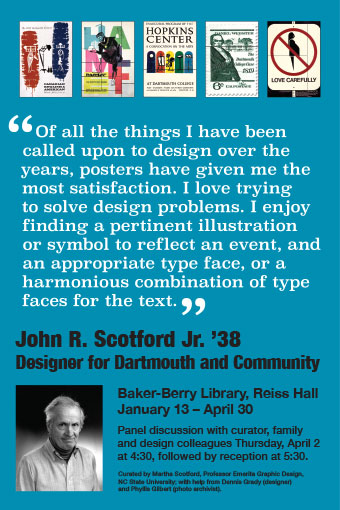 John R. Scotford Jr. loved his years at Dartmouth, even though the College offered no studio art classes in the 1930s. Always creative, he found outlets during his undergraduate years making posters for Ward's Department Store in Hanover and designing a contest-winning cover for Dart, the college literary magazine.
John R. Scotford Jr. loved his years at Dartmouth, even though the College offered no studio art classes in the 1930s. Always creative, he found outlets during his undergraduate years making posters for Ward's Department Store in Hanover and designing a contest-winning cover for Dart, the college literary magazine.
After graduation, John Scotford moved to New York City, studying practical art and design at Pratt Institute in Brooklyn. The first time he returned to Dartmouth, in 1940, he had won the Winter Carnival poster contest. At the time, Scotford was just starting an advertising career in New York, specializing in book promotions for publishers and book jacket design. Throughout his 16 years in New York, Scotford maintained ties to the College by volunteering on fundraising campaigns. He wanted to use his skills and knowledge to benefit his alma mater. In 1956, he moved back to Hanover with his family to work on the proposed Hopkins Center for the Arts.
This exhibit celebrates the work of John Scotford Jr. '38 as Designer for Dartmouth and the wider community.
Exhibit curated by Martha Scotford, Professor Emerita Graphic Design, North Carolina State University; with help from Dennis Grady (designer), Phyllis Gilbert (photo archivist), Deborah Howe (Collections Conservator), and Lizzie Curran (Assistant Conservator).
Baker-Berry Library, Reiss Hall: January 13 through April 30, 2020
Panel discussion with curator, family and design colleagues Thursday, April 2 at 4:30, followed by a reception at 5:30.
Specimens: Artist Books and Their Kin from the Dartmouth Collection
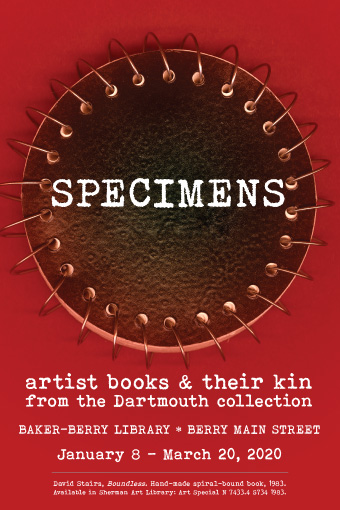 Over the years, artists, designers and craftsmen working in the realm of "book arts" have influenced each other in many ways—sometimes without knowing. The works in this exhibit, whether called artist books, fine press books, zines, or examples of design bindings, involve an artistic approach to the book as a form and method of conveying beautiful design and/or provocative content and in so doing reveal the book as an art form itself.
Over the years, artists, designers and craftsmen working in the realm of "book arts" have influenced each other in many ways—sometimes without knowing. The works in this exhibit, whether called artist books, fine press books, zines, or examples of design bindings, involve an artistic approach to the book as a form and method of conveying beautiful design and/or provocative content and in so doing reveal the book as an art form itself.
This exhibit presents a range of works from the wonderful collection available for viewing and reading at Dartmouth Library. They can be found in Rauner Special Collections, Sherman Art Library's Special Collections as well as in the open stacks. We've included the call numbers and other information to help you find these books and others like them. Hopefully, you too will be inspired by these books to learn more and maybe even make one!
Specimens was curated by Sarah Smith, Book Arts Workshop Program Manager. Graphic design by Dennis Grady.
Baker-Berry Library, Berry Main Street: January 8 through March 20, 2020
Poster image: David Stairs, Boundless. Hand-made spiral-bound book, 1983. Available in Sherman Art Library: Art Special N 7433.4 S734 1983.
Student Library Service Bookplate Program, Dartmouth Class of 2020
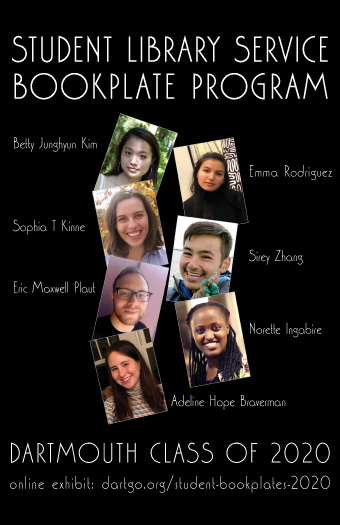 The Student Library Service Bookplate program honors the Library's graduating student employees by inviting them to choose books and other items for the Library's collections. Each item receives a bookplate that acknowledges the student's selection and honors their service to the Library. Students are eligible if they worked at least two terms in any Library department (including RWIT, The Student Center for Research, Writing and Information Technology). The Library is honoring over fifty students from the class of 2020 with selections ranging from fiction, non-fiction, poetry, inspirational works, historical scholarship, and favorite reference titles.
The Student Library Service Bookplate program honors the Library's graduating student employees by inviting them to choose books and other items for the Library's collections. Each item receives a bookplate that acknowledges the student's selection and honors their service to the Library. Students are eligible if they worked at least two terms in any Library department (including RWIT, The Student Center for Research, Writing and Information Technology). The Library is honoring over fifty students from the class of 2020 with selections ranging from fiction, non-fiction, poetry, inspirational works, historical scholarship, and favorite reference titles.
Because of the Covid-19 pandemic this year, the Student Bookplate exhibit was moved to online only.
This year's participants and selections were:
Sirey Zhang: AIDS and Accusation, by Paul Farmer
Adeline Hope Braverman: Altered States of Consciousness, by Charles Tart
Eric Maxwell Plaut: Talking to Strangers, by Malcolm Gladwell
Norette Ingabire: Still Standing - Conversations with Antoine Kaburahe, by Pierre-Claver Mbonimpa
Sophia Kinne: The Kilroys List: 97 Monologues and Scenes by Female and Trans Playwrights, by The Kilroys
Betty Junghyun Kim: Make a Zine: Start Your Own Underground Publishing Revolution, by Joel Biel
Emma Rodriguez: Know My Name - A Memoir, by Chanel Miller
Exhibit curated and designed by Dennis Grady.
Adventuresome Spirit
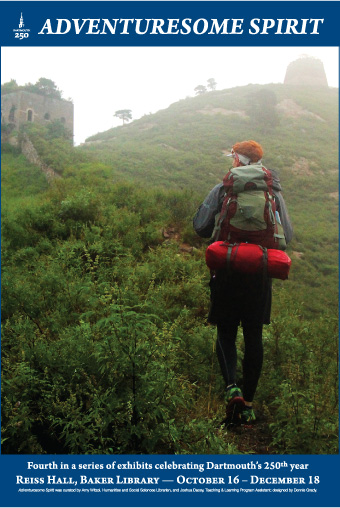 How do you experience adventure at Dartmouth? You may be weathering the long winter months in a frozen land far from home or boldly braving new mental shores in the classroom. Perhaps you are revolutionizing science, medicine, sports, or society for generations to come. The truth is, there is no single Dartmouth adventure. We all experience moments of courage and bravery differently. However, the individual adventures culminate here, at our college—a place for adventuresome spirits. In this exhibit, we offer a small sampling of individuals and groups who have helped to shape the adventuresome spirit at Dartmouth—through innovation, service, teaching, athleticism, exploration, and leadership.
How do you experience adventure at Dartmouth? You may be weathering the long winter months in a frozen land far from home or boldly braving new mental shores in the classroom. Perhaps you are revolutionizing science, medicine, sports, or society for generations to come. The truth is, there is no single Dartmouth adventure. We all experience moments of courage and bravery differently. However, the individual adventures culminate here, at our college—a place for adventuresome spirits. In this exhibit, we offer a small sampling of individuals and groups who have helped to shape the adventuresome spirit at Dartmouth—through innovation, service, teaching, athleticism, exploration, and leadership.
“Outsiders who hire Dartmouth graduates say things like, ‘You’re great team players…you play well in the sandbox, you have great ideas, you’re fearless in how you approach things, you’re curious, you’re tenacious.’ The shorthand became ‘adventuresome spirit.’” (Laurel Richie '81)
Fourth in a series of exhibits celebrating Dartmouth’s 250th year. The Library will be offering several related projects throughout 2019, as well as an online version of each exhibit in the series.
Adventuresome Spirit was curated by Amy Witzel, Humanities and Social Sciences Librarian, and Joshua Dacey, Teaching & Learning Program Assistant; designed by Dennis Grady.
Reiss Hall, Baker Library: October 16 through December 18, 2019
Generations of Community
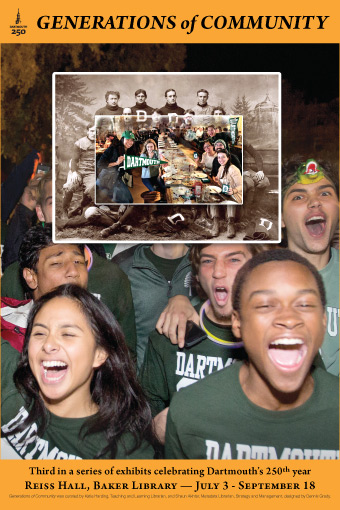 Dartmouth can be envisioned as a universe of communities. There is the singular community of everyone who has ever been involved with Dartmouth. There are also many communities that have existed within this universe across the College’s history, and they are the focus of this exhibit. Generations of Community explores the ways in which fellowship has and has not been manifest throughout the history of the College. How have people at Dartmouth connected with each other? Where do they find meaningful communities? What does the concept of fellowship mean across different facets of campus (and post-campus) life? In what ways have communities at Dartmouth been inclusive, and in what ways have they been exclusive?
Dartmouth can be envisioned as a universe of communities. There is the singular community of everyone who has ever been involved with Dartmouth. There are also many communities that have existed within this universe across the College’s history, and they are the focus of this exhibit. Generations of Community explores the ways in which fellowship has and has not been manifest throughout the history of the College. How have people at Dartmouth connected with each other? Where do they find meaningful communities? What does the concept of fellowship mean across different facets of campus (and post-campus) life? In what ways have communities at Dartmouth been inclusive, and in what ways have they been exclusive?
Third in a series of exhibits celebrating Dartmouth’s 250th year. The Library will be offering several related projects throughout 2019, as well as an online version of each exhibit in the series.
Generations of Community was curated by Katie Harding, Teaching and Learning Librarian, and Shaun Akhtar, Metadata Librarian, Strategy and Management; designed by Dennis Grady.
Reiss Hall, Baker Library: July 3 - September 18, 2019
Curriculum Vitae
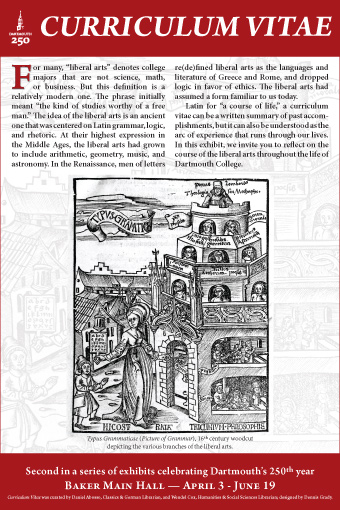 For many, “liberal arts” denotes college majors that are not science, math, or business. But this definition is a relatively modern one. The phrase initially meant “the kind of studies worthy of a free man.” The idea of the liberal arts is an ancient one that was centered on Latin grammar, logic, and rhetoric. At their highest expression in the Middle Ages, the liberal arts had grown to include arithmetic, geometry, music, and astronomy. In the Renaissance, men of letters re(de)fined liberal arts as the languages and literature of Greece and Rome, and dropped logic in favor of ethics. The liberal arts had assumed a form familiar to us today.
For many, “liberal arts” denotes college majors that are not science, math, or business. But this definition is a relatively modern one. The phrase initially meant “the kind of studies worthy of a free man.” The idea of the liberal arts is an ancient one that was centered on Latin grammar, logic, and rhetoric. At their highest expression in the Middle Ages, the liberal arts had grown to include arithmetic, geometry, music, and astronomy. In the Renaissance, men of letters re(de)fined liberal arts as the languages and literature of Greece and Rome, and dropped logic in favor of ethics. The liberal arts had assumed a form familiar to us today.
Latin for “a course of life,” a curriculum vitae can be a written summary of past accomplishments, but it can also be understood as the arc of experience that runs through our lives. In this exhibit, we invite you to reflect on the course of the liberal arts throughout the life of Dartmouth College.
Second in a series of exhibits celebrating Dartmouth’s 250th year. The Library will be offering several related projects throughout 2019, as well as an online version of each exhibit in the series.
Curriculum Vitae was curated by Daniel Abosso, Classics & German Librarian, and Wendel Cox, Humanities & Social Sciences Librarian; designed by Dennis Grady.
Baker Main Hall: April 3 - June 19, 2019
On Solid Ground
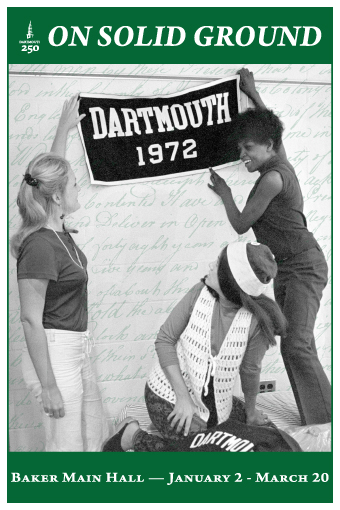 Dartmouth seems so grounded in space, especially to a student here for four years seeing little change and plenty of indicators of stability. There is a sense of something solid, not static so much as stable. Old buildings and history around every corner create a sense that things don’t change, but that is far from the reality. Looked at over 250 years, the social, physical, and intellectual space is ever shifting. It welcomes some and excludes others. It creates security but also poses threats. It is bucolic, yet cosmopolitan. It is stable, but ever in flux.
Dartmouth seems so grounded in space, especially to a student here for four years seeing little change and plenty of indicators of stability. There is a sense of something solid, not static so much as stable. Old buildings and history around every corner create a sense that things don’t change, but that is far from the reality. Looked at over 250 years, the social, physical, and intellectual space is ever shifting. It welcomes some and excludes others. It creates security but also poses threats. It is bucolic, yet cosmopolitan. It is stable, but ever in flux.
There is something odd about a college campus with so few maps and signs scattered among the buildings. It assumes a sense of community, but it can also systematically exclude those outside of the community. This exhibit strives to provide a kind of map of campus—one that shows the spaces that make up Dartmouth, but one that also shakes the illusion of stability and questions who and how these spaces serve.
First in a series of exhibits celebrating Dartmouth’s 250th year. The Library will be offering several related projects throughout 2019, as well as an online version of each exhibit in the series.
On Solid Ground was curated by Jay Satterfield, Head of Special Collections, and Peter Carini, College Archivist; designed by Dennis Grady. Thanks to Laura Barrett and Joshua Dacey for editorial assistance, and to Deborah Howe and Lizzie Curran for installation support.
Baker Main Hall: January 2 - March 20, 2019
EAT, DRINK, JAPAN- The Complex World of Japanese Food Culture
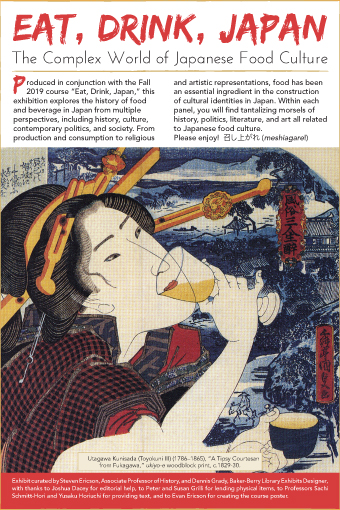 Produced in conjunction with the Fall 2019 course “Eat, Drink, Japan,” this exhibition explores the history of food and beverage in Japan from multiple perspectives, including history, culture, contemporary politics, and society. From production and consumption to religious and artistic representations, food has been an essential ingredient in the construction of cultural identities in Japan. Within each panel, you will find tantalizing morsels of history, politics, literature, and art all related to Japanese food culture.
Produced in conjunction with the Fall 2019 course “Eat, Drink, Japan,” this exhibition explores the history of food and beverage in Japan from multiple perspectives, including history, culture, contemporary politics, and society. From production and consumption to religious and artistic representations, food has been an essential ingredient in the construction of cultural identities in Japan. Within each panel, you will find tantalizing morsels of history, politics, literature, and art all related to Japanese food culture.
Please enjoy! 召し上がれ (meshiagare!)
Exhibit curated by Steven Ericson, Associate Professor of History, and Dennis Grady, Baker-Berry Library Exhibits Designer, with thanks to Joshua Dacey for editorial help, to Peter and Susan Grilli for lending physical items, to Professors Sachi Schmitt-Hori and Yusaku Horiuchi for providing text, and to Evan Ericson for creating the course poster.
Baker-Berry Library, Berry Main Street: Fall Term, 2019
Student Library Service Bookplate Program, Dartmouth Class of 2019
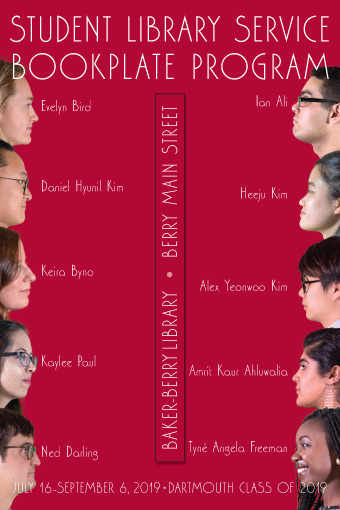 The Student Library Service Bookplate Program honors the Library’s graduating student employees by inviting them to choose books and other items for the Library’s collections. Each item will receive a bookplate that acknowledges the student’s selection and honors his or her service to the Library. Students are eligible if they worked at least two terms in any Library department (including RWIT, The Student Center for Research, Writing and Information Technology).
The Student Library Service Bookplate Program honors the Library’s graduating student employees by inviting them to choose books and other items for the Library’s collections. Each item will receive a bookplate that acknowledges the student’s selection and honors his or her service to the Library. Students are eligible if they worked at least two terms in any Library department (including RWIT, The Student Center for Research, Writing and Information Technology).
The Library will honor over fifty students from the class of 2019 with selections ranging from world fiction, poetry, cookbooks, and DVDs to children’s books, inspirational works, and historical scholarship.
This year's featured students are Amrit Kaur Ahluwalia • Ian Ali • Evelyn Bird • Keira Byno • Ned Darling • Tyné Angela Freeman • Alex Yeonwoo Kim • Daniel Hyunil Kim • Heeju Kim • Kaylee Paul.
Exhibit design and photography by Dennis Grady, Library Teaching & Learning. Many thanks to the students who volunteered to participate in this exhibit, and to: Richard Langdell, Library Services Specialist; Tim Wolfe, Acquisitions Services Supervisor; and Goodie Corriveau, Acquisitions Assistant.
Baker-Berry Library, Berry Main Street: July 16 - September 6, 2019
Project 562: Changing the Way We See Native America
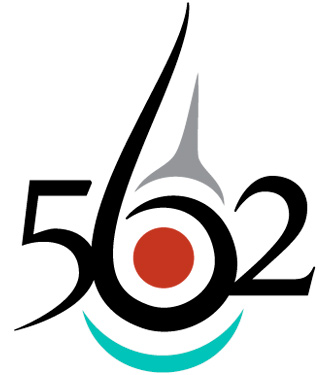
Created by Matika Wilbur, a visual storyteller from the Swinomish and Tulalip peoples of coastal Washington, Project 562 is a multi-year national photography project dedicated to photographing over 562 federally recognized tribes in the United States resulting in an unprecedented repository of imagery and oral histories that accurately portrays contemporary Native Americans. This creative, consciousness-shifting work will be widely distributed through national curricula, artistic publications, exhibitions, and online portals.
Baker-Berry Library, Berry Main Street: April 1 - June 30, 2019
1968 - The World Turned Upside Down
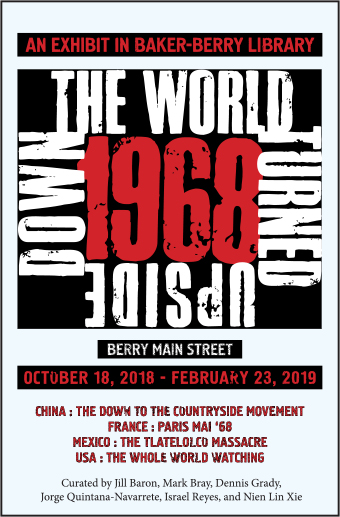
In this exhibit we mark the 50th anniversary some of the tumultuous events of 1968 as they unfolded across the globe:
China's Down to the Countryside Movement, Paris Mai '68, the Tlatelolco Massacre in Mexico, and the general political upheaval in the USA.
Exhibit curated by Jill Baron, Mark Bray, Dennis Grady, Jorge Quintana-Navarrete, Israel Reyes, and Nien Lin Xie; designed by Dennis Grady, Library Teaching & Learning.
Baker-Berry Library, Berry Main Street: October 18, 2018 - February 23, 2019
Collections Showcase: Original Etchings by American Artists
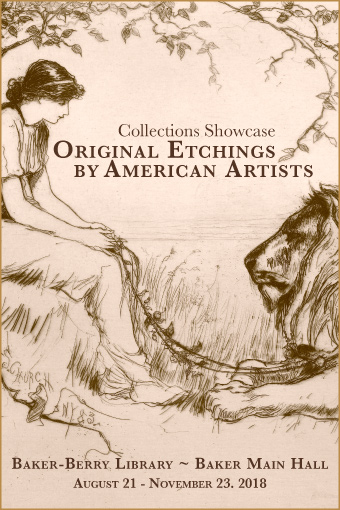
Original Etchings by American Artists was published at a time in American history when the country was trying to establish an artistic identity and visual presence that could rival Europe’s. Sylvester Rosa Koehler, the first curator of prints at the Museum of Fine Arts in Boston and editor of this work, went on to be a curator of graphic arts at the Smithsonian and was also an editor and contributor to American Art Review. He commissioned all of the etchings included in the volume and he chose artists who were at the top of the 19th century American art scene.
Dartmouth’s copy of Original Etchings by American Artists can be viewed in Sherman Art Library by asking for NE2186 .K7 in Art Special. The volume can also be viewed online, as it was recently digitized by the Dartmouth Digital Library Program (DLP). The DLP promotes innovative research and teaching through the strategic digitization of Library collections and the open access publication of digital scholarship. Many of these prints from this volume can be viewed individually in museums around the country, and it is rare to find a complete volume today. Dartmouth’s print volume is, in fact, missing two prints, which have been generously provided for the online collection by the Smith College Museum of Art.
This exhibit is part of Collections Showcase, a series of occasional exhibits that highlight Dartmouth College Library’s collections. To suggest future exhibit topics contact Laura Barrett, Director of Library Education & Outreach. Text by Laura Graveline, Monica Erives, and Laura Barrett. Exhibit design by Dennis Grady, Library Education & Outreach.
Baker-Berry Library, Baker Main Hall: August 21 - November 23, 2018
The Montgomery Fellows Program at Dartmouth College 40th Anniversary
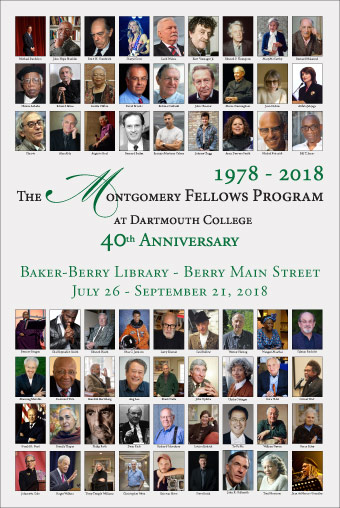
For nearly four decades, the Montgomery Endowment, created by a gift from Kenneth ’25 and Harle Montgomery, has brought distinguished guests to campus to live, work, teach, and engage with the Dartmouth community. The Endowment’s mission is to bring outstanding luminaries from the academic world as well as from non-academic spheres to campus.
Over the past four decades, the Montgomery Endowment has hosted more than 230 distinguished fellows, many of whom came back a second or even a third time. During their residencies, the fellows visit classes, meet with faculty and students, and give public lectures.
The Montgomery Fellows Program has reached out across the disciplines and beyond academic life, installing on campus playwrights and film directors, novelists, musicians, scientists, politicians, and journalists. Designated lifelong “Montgomery Fellows,” these distinguished individuals are in Hanover for varying lengths of time, ranging from a few days up to a full term. During their incumbencies, the fellows and their families inhabit the Montgomery House, a comfortable and gracious residence adjacent to campus and overlooking Occom Pond.
Exhibit curated by Klaus Milich, Director of the Montgomery Fellows Program; designed by Dennis Grady, Library Education & Outreach.
Baker-Berry Library, Berry Main Street: July 26 - September 21, 2018
Student Library Service Bookplate Program - Dartmouth Class of 2018
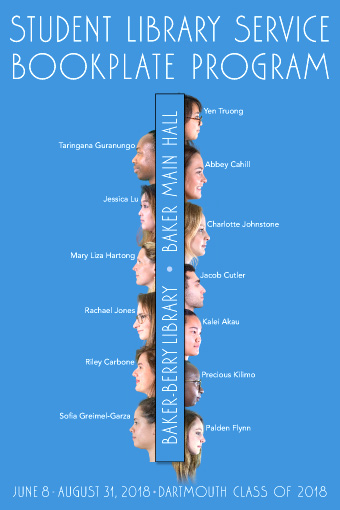
The Student Library Service Bookplate Program honors the Library’s graduating student employees by inviting them to choose books and other items for the Library’s collections. Each item will receive a bookplate that acknowledges the student’s selection and honors his or her service to the Library. Students are eligible if they worked at least two terms in any Library department (including RWIT, The Student Center for Research, Writing and Information Technology). The Library will honor nearly fifty students from the class of 2018 with selections ranging from world fiction, poetry, cookbooks, and DVDs to children’s books, inspirational works, and historical scholarship.
This year's featured students are Kalei Akau • Abbey Cahill • Riley Carbone • Jacob Cutler Palden Flynn • Sofia Greimel-Garza • Taringana Guranungo Mary Liza Hartong • Charlotte Johnstone • Rachael Jones Precious Kilimo • Jessica Lu • Yen Truong
Exhibit design and photography by Dennis Grady, Library Education & Outreach. Many thanks to the students who volunteered to participate in this exhibit, and to: Richard Langdell, Library Services Specialist; Tim Wolfe, Acquisitions Services Supervisor; and Goodie Corriveau, Acquisitions Assistant.
Baker-Berry Library, Baker Main Hall: June 8 - August 31, 2018
I WILL TELL YOU THE TRUTH ABOUT A MAN’S LIFE: The Mario Puzo Papers
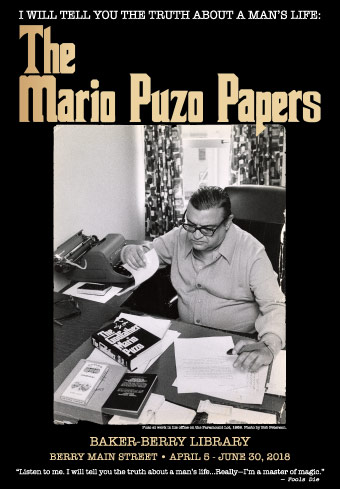
Last summer, the Dartmouth College Library got an offer it couldn’t refuse: a gift of the archives of Mario Puzo, novelist, screenwriter and the creator of The Godfather, the book and movie that spawned the modern myth of the mafia. Thanks to the generosity of the donors, Diana and Bruce Rauner ’78, the collection is now placed in Rauner Special Collections Library where it will be used to support research and to enhance the classroom experience of Dartmouth students. It holds so much promise. The collection documents Puzo’s initial struggles and remarkable rise, catalogs his foibles and personal insecurities, and comments on the writing profession in the 20th century. But most importantly, it shows the creation and development of the dominant popular conception of the mob in America—seemingly, every mafia cliché has its origins in these papers. As we said, it was an offer we couldn’t refuse.
This exhibit was made possible through the generosity of Diana and Bruce Rauner. It was curated by Hazel-Dawn Dumpert; designed by Dennis Grady, Library Education & Outreach; with assistance from Veronica Cook Williamson, Jones Memorial Digital Media Fellow; Deborah Howe, Collections Conservator; Lizzie Curran, Assistant Conservator; and Elena Cordova, Special Collections Processing Specialist.
Baker-Berry Library, Berry Main Street: April 5 - June 30, 2018
Will Carter and the Dartmouth Typeface
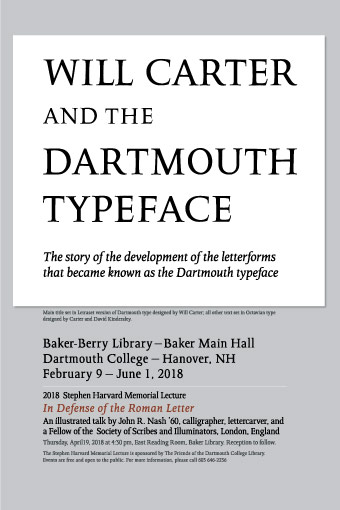
The story of the development of the letterforms that became known as the Dartmouth typeface
In the early 1960s, Will Carter carved a series of inscriptions on teak panels for the college. Those letters, in their different iterations over the years, became known as the Dartmouth typeface. This is the story behind the chronology and the people involved in the development of that typeface.
Curated by Won K. Chung. Special thanks to Sebastian Carter, Martha Scotford, John R. Nash, Holly Nash Wolff, Jay Satterfield, director of Rauner Special Collections Library, and Dennis Grady, exhibits designer with Library Education & Outreach. Exhibit title set in Letraset version of Dartmouth; all other text set in Octavian. Dartmouth typeface copyrighted by Rampant Lions Press. Exhibit text and captions copyright by Won K. Chung.
Baker-Berry Library, Baker Main Hall: February 9 - June 1, 2018
In conjunction with this exhibit, The Friends of the Dartmouth Library cordially invite you to the 2018 Stephen Harvard Memorial Lecture: In Defense of the Roman Letter, delivered by John R. Nash ’60, calligrapher, stone letter-carver, and a Fellow of the Society of Scribes and Illuminators, London, England.
Thursday, April 19, 2018 at 4:30 pm, East Reading Room, Baker Library
Reception to follow
Events are free and open to the public.
The Coconut Crab - Biology, Art, Conservation, and Darwin
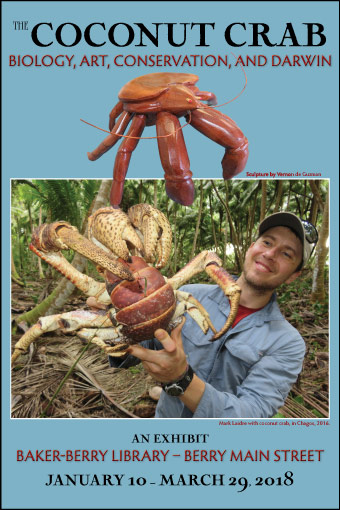
This exhibit covers the ABCs (actually the ABCDs—Art-Biology-Conservation-Darwin) of coconut crabs. You can see original editions of Charles Darwin’s writings on coconut crabs, as well as natural history pictures, preserved specimens, and other biological materials that were brought back by Mark Laidre after a study of coconut crabs from January to March 2016 on earth’s largest coral atoll, Chagos Archipelago. Following this scientific study, many of Mark’s artist friends were inspired to produce beautiful artwork, which is prominently displayed in this exhibit to celebrate coconut crabs.
The exhibit includes artworks and writings by Sophia Budny, Rosemary Feit Covey, Robert DuGrenier, Sam Gochman, Vernon de Guzman, Keyan Kaplan, Alex Lamb, Tracy Punshon, Holly Shaffer, and Sarah Smith.
Curated by Mark Laidre, Assistant Professor of Biological Sciences.
Exhibit design by Dennis Grady, Library Education & Outreach
Baker-Berry Library, Berry Main Street: January 10 - March 29, 2018
Dimensions of Open
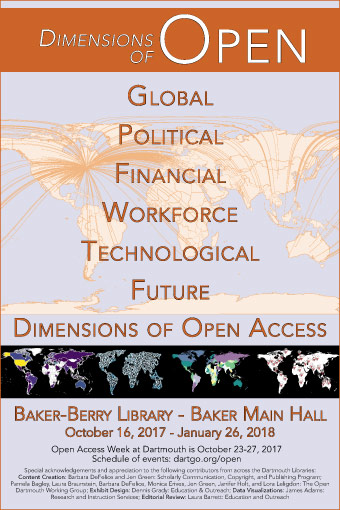
Dimensions of Open is inspired by the efforts of Dartmouth authors, creators, artists, and inventors to make the results of their work openly and publicly available. The work of Dartmouth scholars and researchers is often in collaboration with authors across the globe, and immediate access to that work has a significant global impact. This exhibit reveals the complex issues surrounding open information through six dimensions: global, political, financial, workforce, technological, and future.
Special thanks to those who made this exhibit possible:
Content Creation: Barbara DeFelice and Jen Green: Scholarly Communication, Copyright, and Publishing Program; Pamela Bagley, Laura Braunstein, Barbara DeFelice, Monica Erives, Jen Green, Janifer Holt, and Lora Leligdon: The Open Dartmouth Working Group; Exhibit Design: Dennis Grady: Education & Outreach; Data Visualizations: James Adams: Research and Instruction Services; Editorial Review: Laura Barrett: Education and Outreach.
Baker-Berry Library, Baker Main Hall: October 16, 2017 - January 26, 2018
Partnering for a Better World: The Matariki Network of Universities
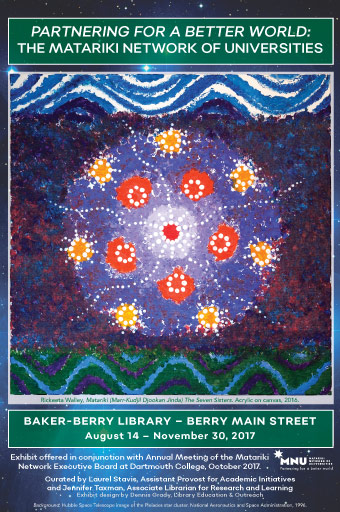
The Matariki Network of Universities is an international consortium of seven leading universities on three continents and in seven countries. It was established in 2010 to create new opportunities for collaboration in research and education, to foster faculty, student and staff exchange, create a forum for sharing best practices, and to promote local and global social responsibility . Matariki members are critical friends and trusted partners.
Matariki is the Māori name for the Pleiades star cluster, also known as the Seven Sisters. Matariki is also the word for the Māori New Year, which marks the rise of Matariki and the sighting of the new moon.
The creation of the Matariki Network of Universities was inspired by the Pleiades, and represents the relationship between, and collaboration among, seven of the world’s leading universities.
Matariki member institutions include Dartmouth (United States), Durham (United Kingdom), Queen’s (Canada), Uppsala (Sweden), Tübingen (Germany), the University of Western Australia, and the University of Otago (New Zealand).
Exhibit offered in conjunction with Annual Meeting of the Matariki Network Executive Board at Dartmouth College, October 2017.
Curated by Laurel Stavis, Assistant Provost for Academic Initiatives and Jennifer Taxman, Associate Librarian for Research and Learning.
Exhibit design by Dennis Grady, Library Education & Outreach
Poster illustration: Rickeeta Walley, Matariki (Marr-Kudjil Djookan Jinda) The Seven Sisters. Acrylic on canvas, 2016.
Baker-Berry Library, Berry Main Street: August 14 - November 30, 2017
Student Library Service Bookplate Program: Dartmouth Class of 2017
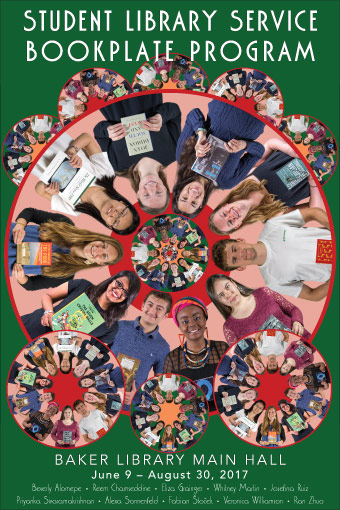
The Student Library Service Bookplate Program honors graduating student library employees by inviting them to choose books and other items for the Library’s collections. Each item will include a bookplate acknowledging the student’s selection and recognizing his or her service to the Library. Students are eligible if they worked at least two terms in any Library department, including the Student Center for Research, Writing and Information Technology (RWIT). This year Dartmouth College Library honors almost forty students from the Class of 2017 with selections including works of fiction, musical CDs, and classic works of the cartoon arts to a musical score and a history of makeup.
Each year the Library invites graduating student library employees to paricipate in an exhibit about the program. This year's participants are Beverly Alomepe, Reem Chamseddine, Eliza Grainger, Whitney Martin, Josefina Ruiz, Priyanka Sivaramakrishnan, Alexa Sonnenfeld, Fabian Štoček, Veronica Williamson, and Ran Zhuo.
Exhibit design and photography by Dennis Grady, Library Education & Outreach. Many thanks to the students who volunteered to participate in this exhibit and to: Wendel Cox, Librarian for History & English; Greg Potter, Research and Information Desk Coordinator; and Goodie Corriveau, Acquisitions Assistant.
Baker-Berry Library, Baker Main Hall: June 9 - August 30, 2017
Protest! at Dartmouth

College campuses have a long history as sites of activism and protest. It’s a truth acknowledged easily enough by today’s students, who have witnessed and in some cases participated in current movements like Black Lives Matter, #NoDAPL, and the Women’s March on Washington, among numerous others. What may be less apparent is the role the college plays when the activism dust settles.
At Dartmouth, the archivists of Rauner Special Collections Library are committed to recording the College’s history—the history of many years ago and the history of yesterday—through primary source documents. Campus activism is a significant part of this history, and one of the most effective ways of capturing it is via first-person narrative.
Oral history is an interview-based approach to documenting the past, centering around an in-depth, recorded conversation between two people: the oral historian and an individual who experienced a particular event, era, or culture firsthand. Because of its emphasis on non-dominant perspectives and marginalized voices, oral history is uniquely situated among history methodologies to document moments of protest and dissent. It is, at its heart, a means of telling stories that might otherwise have gone untold.
This exhibit explores three protest movements in Dartmouth’s past, and a selection of oral history interviews with individuals who experienced them. These interviews and many more are available at Rauner Special Collections Library.
Exhibit curated by Caitlin Birch, Digital Collections and Oral History Archivist, and designed by Dennis Grady, Library Education & Outreach.
Baker-Berry Library, Berry Main Street: May 1 - July 30, 2017
Zircons, Chrysoberyls, Tourmalines, and Opals - Jewelry Design Books of Jaques and Marcus 1890-1926
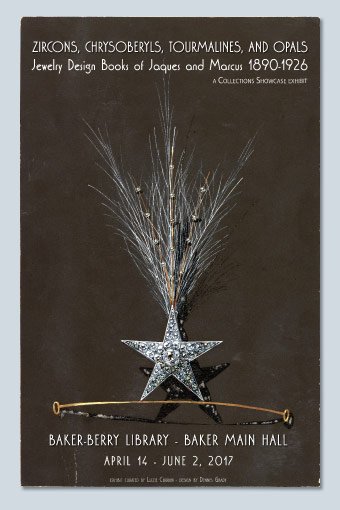
The Jaques & Marcus jewelry firm, later Marcus & Company, was established in New York City in 1892 by Herman Marcus and his son William shortly after they immigrated from Germany. Herman Marcus, a skilled jeweler trained in traditional plique-à-jour enameling techniques, quickly became a widely-known and respected designer. Marcus’s affinity for using semi-precious and uncommon gems was central to his jewelry designs.
The firm was bought by a larger company after World War II and eventually dissolved by the 1960s, but the prominence of Marcus & Co. in its prime was equal to that of Tiffany & Co.
The Art Nouveau movement, which began in Europe, reached the shores of the United States due to the popularity of designers like Tiffany and Marcus. This artistic movement was a reaction to the Industrial Revolution and the rise of factory-made goods that lacked the unique quality of handmade objects and the asymmetry of the natural world. In Art Nouveau, the utilitarian gave way to the ornate. Artists and craftsmen in the graphic and decorative arts incorporated botanical elements and flowing lines to elevate everyday objects into works of art.
The original designs made by artists at Marcus & Co. at the turn of the 20th century were compiled into eight albums for the firm’s archives. Burton Elliot ’48 donated these albums to Dartmouth College in 1987, and they served as inspiration in Dartmouth’s Donald Claflin Jewelry Studio for many years. Each delicate drawing and intricate painting portrays a custom piece designed by the firm. The drawings are exquisite examples of Art Nouveau style and each stands as a small masterpiece in itself.
The Metropolitan Museum of Art recently requested the albums be digitized in preparation for the Met’s upcoming museum-wide exhibit on jewelry. First, the albums were stabilized so they could be transported and opened for imaging without risking damage. Conservation staff cleaned the albums of accumulated soot, created new spines out of archival materials, and mended torn pages. With generous support from the Metropolitan Museum of Art, the albums were then transported to the Northeast Document Conservation Center to be photographed and digitized. The images displayed here are select examples from the eight volume set, which can be viewed in its entirety in Rauner Special Collections Library.
Exhibit curated by Lizzie Curran, Assistant Library Conservator, and designed by Dennis Grady, Library Education & Outreach.
Baker-Berry Library, Baker Main Hall: April 14 - June 2, 2017
"...a long, long way to go..."
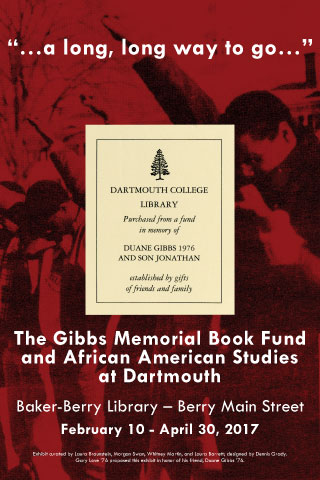
The Gibbs Memorial Book Fund and African American Studies at Dartmouth
The Duane Gibbs '76 and William Rice '76 Memorial Book fund is one of many funds in the Library that memorializes Dartmouth's alumni. This particular fund is for the acquisition of books, journals, and reference materials by African American authors. The fund was originally established in 1989 by Reginald Thomas '75, P'10, William Rice '76, P'19, and Gary Love '76, P'10 in honor of their dear friend Duane Gibbs '76, who died that same year. Rice's name was added to the fund after his death in 2016 to memorialize his devotion to his friend Duane and to his alma mater Dartmouth.
The 40th anniversary of Gibbs's, Rice's, and their friends' graduation provides the opportunity to explore the African American educational experience at Dartmouth in and around 1976. This exhibit explores the development of the African and African American Studies Program, the life and work of Errol Hill, an African American educator at Dartmouth, and works by African American authors in the Library's collections.
This exhibit is displayed with gratitude to Gary Love '76 for proposing the exhibit, Dennis Grady the exhibit designer, and curators Laura Braunstein, Morgan Swan, Whitney Martin, and Laura Barrett.
Baker-Berry Library, Berry Main Street: February 10 - April 30, 2017
Exhibit reception, Berry Main Street: Monday, April 10, 3:30-4:30pm
Tibetan and Himalayan Lifeworlds
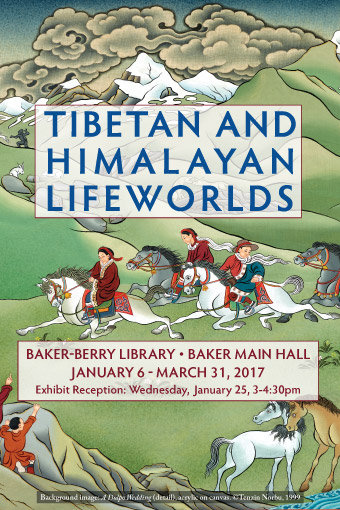
Tibetan and Himalayan Lifeworlds provides a window onto the unique culture and environment of the 'Roof of the World.' This exhibit explores the social and religious practices that shape life in Asia's high mountain environments, explores the political history of the region, and describes some of the encounters between foreigners and Himalayan and Tibetan people over time. The exhibit has been curated by Senior Lecturer Kenneth Bauer and Associate Professor Sienna Craig.
Tibetan and Himalayan Lifeworlds is enriched by the presence on campus of artist Tenzin Norbu, a painter from Dolpo, Nepal. Norbu studied traditional thangka painting as well as Buddhism from his father, following a lineage of painters that dates back more than 400 years. He is also one of the leading figures in contemporary Tibetan art. In January 2017, Norbu will spend time painting in Baker-Berry Main Hall (Thursday, January 19 and Wednesday, January 25, 9:30am-2:30pm), visiting classes, and staging a popup exhibit of some of his recent work at the Black Family Arts Center. For more information on Norbu's visit go to https://news.dartmouth.edu/events/event?event=42728.
This exhibit and Tenzin Norbu's residency at Dartmouth is made possible by support from the Dartmouth College Library, the HOOD Museum of Art, the Leslie Center for the Humanities, the Rockefeller Center, the Asian and Middle Eastern Studies program, and the departments of Anthropology, Art History, Religion, and Studio Art.
Exhibit design by Dennis Grady, Library Education & Outreach. Julia Cohen '18, a Presidential Scholar, contributed to the research, planning, and execution of this exhibit..
Baker-Berry Library, Baker Main Hall: January 6 - April 10, 2017
Paper - A Material of Empire and Revolution in South Asia
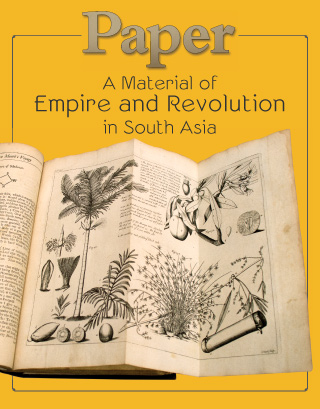
Paper is increasingly being replaced by screens, but it has been the material of conveying knowledge for millennia. As a motto written on manuscripts in an Indian archive dictates, a book should “be adorned like a dear son…safeguarded like a good plot of land…purified daily like one’s own body…and looked upon…like a good friend; it should be tied fast like a culprit sentenced to death and should always be remembered like the name of God.” The book is the material recording and dictating society, to be tended to and penalized, revered and conversant, but it is also vulnerable. Only if the book is preserved and protected will it escape from a “state of deterioration.” For the weakness of paper is in its fibers: delicious to insects, fading in sunlight, easy to tear, dampen, and decay.
In this exhibition, curated by Holly Shaffer, Mellon Postdoctoral Fellow in the Humanities, and her students in Art History class 17.14, Art and Industry in South Asia, 1800 to the Present, and drawn from materials in Baker-Berry Library and Rauner Special Collections Library, we examine the history of paper in South Asia (including present-day India, Pakistan, Bangladesh, Nepal, and Sri Lanka) through the materials that chronicle it in four cases. First as a product in the case titled “Paper Made,” then as a vehicle for 19th-century British colonial bureaucracy in “Paper Empire.” Third, as a “Paper Revolt,” a 20th-century method of disseminating an anti-colonial, nationalist movement for independence, and finally in the contemporary artist Dayanita Singh’s photographs of archives. Here, “Post Paper,” bundles, stacks, files, and folders seem to wait patiently for a reader, slowly turning to dust. Paper not only creates and disperses history, but also becomes the source for its own documentation and demise.
Exhibit curated by Holly Shaffer, Mellon Postdoctoral Fellow in the Humanities - South Asian & British Art, and her students in ARTH 17.14, Art and Industry: The Visual and Material Culture of South Asia, 1800 to Present:
Zachary Cherian ’20, Perri Haser ’17, Saleha Irfan ’19, Marina Massidda ’17, India Perdue ’19, Anneliese Thomas ’19, Emma Woodberry ’19, Haley Woodberry ’17
Sponsored by the Art History Department, Baker-Berry Library, the Leslie Center for the Humanities, and Rauner Special Collections Library.
Exhibit design by Dennis Grady, Library Education & Outreach.
Materials support by Deborah Howe, Collections Conservator and Lizzie Curran, Assistant Conservator.
Baker-Berry Library, Berry Main Street: November 1, 2016 - January 27, 2017
Printing Down Under
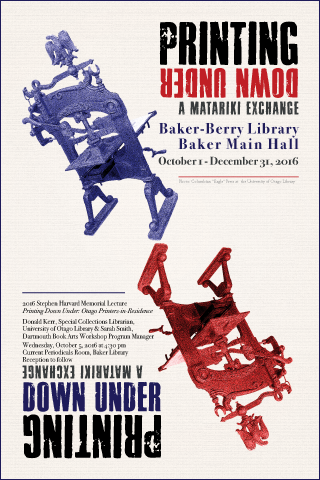
A Matariki Exchange
The Printer in Residence Program at University of Otago Library’s Otakou Press in Dunedin, New Zealand was initiated in 2003 to encourage awareness of the Press’ printmaking facilities and to foster book-making within both the University and the broader arts community. Each visiting printer uses the University Library’s printing presses to produce a limited edition publication. Sarah Smith, Dartmouth College Book Arts Workshop Program Manager, was this year’s Printer in Residence.
Dartmouth and the University of Otago are both members of the Matariki Network of Universities, an international group of seven universities from seven different countries that have long-excelled in research-led education. The five other Matariki members are: Durham University, England; Queen’s University, Canada; University of Tubingen, Germany; University of Western Australia; and Uppsala University, Sweden.
This year the Otakou Press added a new element to the residency program—an exhibit exchange. An exhibit featuring Dartmouth Book Arts Workshop was displayed in the University of Otago’s Library during Sarah’s residency, and upon her return Sarah facilitated the installation of this exhibit featuring the work of the Otakou Press’ past and present Printers in Residence.
Printing Down Under: A Matariki Exchange was curated by Donald Kerr, Special Collections Librarian at the University of Otago Library; Dennis Grady, Dartmouth Library Education & Outreach; and Sarah Smith, Book Arts Workshop Program Manager. Exhibit design by Dennis Grady.
Baker-Berry Library, Baker Main Hall: October 1 - December 31, 2016
Unforgettable First Pages
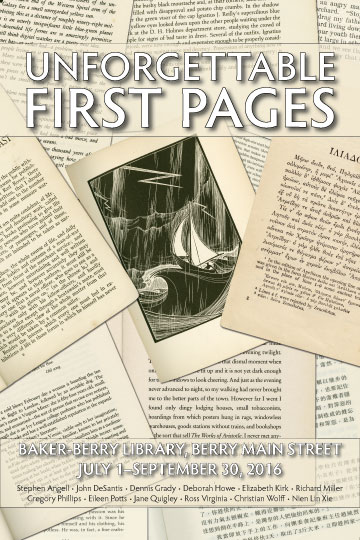
We asked members of the Dartmouth community to suggest unforgettable first pages. Twelve responses are included in this exhibit.
First Pages selected by:
Stephen Angell, Baker-Berry User Services Technology Coordinator;
John DeSantis, Cataloging and Metadata Services Librarian;
Dennis Grady, Baker-Berry Exhibits Designer;
Deborah Howe, Collections Conservator;
Elizabeth Kirk, Associate Librarian for Information Services;
Richard Miller, Baker-Berry Access Services Student Supervisor;
Gregory Phillips, Senior IT Support Analyst;
Eileen Potts, Library Information Access Assistant;
Jane Quigley, Head of Kresge Physical Sciences Library;
Ross Virginia, Director, Institute of Arctic Studies and Myers Family Professor of Environmental Science;
Christian Wolff, composer;
Nien Lin Xie, Librarian for East Asian Studies.
Exhibit curated and designed by Dennis Grady, Library Education and Outreach.
Baker-Berry Library, Berry Main Street: July 1 - September 30, 2016
Digital Humanities at Dartmouth: Portraits of a Community of Practice
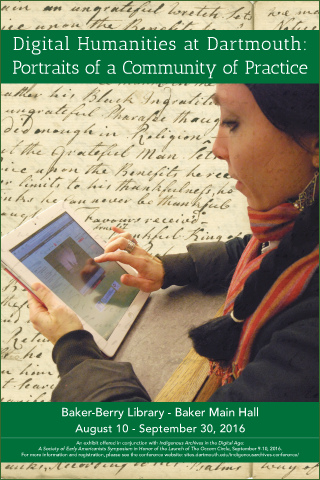
What is digital humanities?
It is a community of practice at the intersection of texts and technologies. Digital humanists seek both to understand human culture (literature, art, media) by using technology, and to understand technology through a humanist lens. Digital humanists use computational methods, build digital collections, design online games, create new media, analyze textual data, and think critically about the technological environment in which we carry out our daily lives. Digital humanities is a collaborative endeavor, involving faculty and scholars across the disciplines—including English, Anthropology, Computer Science, Film & Media Studies, and Classics, to name a few—and practitioners around the institution, including technologists, archivists and librarians, graphic designers, programmers, and students, who work together in cross-disciplinary, cross-functional teams that operate outside traditional academic hierarchies. Currently, Dartmouth has a thriving digital humanities community. This exhibit showcases many—but not all—of the projects happening now at Dartmouth; we invite you to explore our work and our community further at digitalhumanities.dartmouth.edu
Digital Humanities at Dartmouth: Portraits of a Community of Practice was curated by Laura Braunstein, Digital Humanities and English Librarian, and Scott Millspaugh, Instructional Designer. Design by Dennis Grady, Library Education & Outreach.
Baker-Berry Library, Baker Main Hall: August 10 - September 30, 2016
Student Library Service Bookplate Program
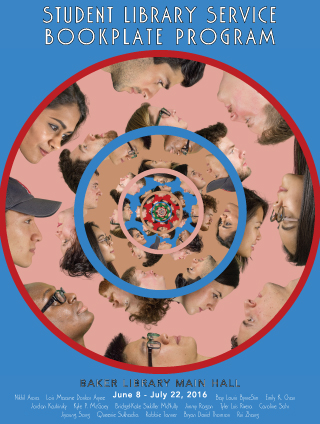
Dartmouth Class of 2016
The Student Library Service Bookplate Program honors the Library’s graduating student employees by inviting them to choose books and other items for the Library’s collections. Each item will receive a bookplate that acknowledges the student’s selection and honors his or her service to the Library.
Students are eligible if they worked at least two terms in any Library department (including RWIT, The Student Center for Research, Writing and Information Technology).
The Library will honor nearly fifty students from the class of 2016 with selections ranging from world fiction, cookbooks, and DVDs to children’s books, inspirational works, and historical scholarship.
The students who volunteered to participate in this year's exhibit are:
Nikhil Arora • Lois Maame Donkor Aryee • Bay Lauris ByrneSim • Emily K. Chan • Jordan Kastrinsky • Kyle P. McGoey • Bridget-Kate Sixkiller McNulty • Jimmy Ragan • Tyler Luis Rivera • Caroline Sohr • Jiyoung Song • Queenie Sukhadia • Robbie Tanner • Bryan David Thomson • Rui Zhang
Exhibit design and photography by Dennis Grady, Library Education & Outreach. Many thanks to the fifteen students and interns who volunteered to participate in this exhibit, and to: Greg Potter, Research and Information Desk Coordinator; Goodie Corriveau, Acquisitions Assistant; Jillian Hinchliffe, Research & Instruction Services Information Associate; and Laura Braunstein, Digital Humanities and English Librarian, for their organizational help.
Baker-Berry Library, Baker Main Hall: June 8 - July 22, 2016
Daoist Ritual and Practice
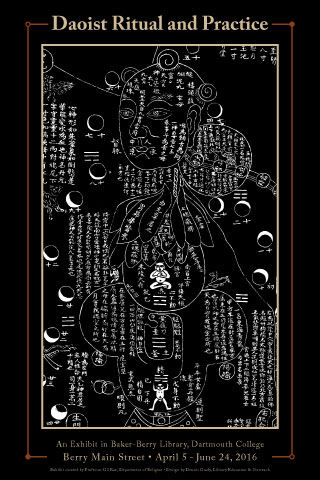
Exploring specific moments from the rich tapestry of religious culture in China, this exhibit shows different ways for interacting with the divine, attaining transcendence, and establishing community. This variety of ideas and practices hint at the complex interactions between traditions and communities in China, and beyond, and show the richness of religious life and experience, limited only by the human imagination.
Exhibit curated by Professor Gil Raz, Department of Religion; design by Dennis Grady, Library Education and Outreach. Video editing by Xiaofan Zhang, Jones Media Center Digital Media Assistant.
Cosponsored by the Religion Department, Dean of Faculty Office, and Baker-Berry Library.
Baker-Berry Library, Berry Main Street: April 5 - June 24, 2016
Out of the Archive – Into the Streets: Dartmouth College, the Martín Chambi Archive, and the City of Cusco, Peru
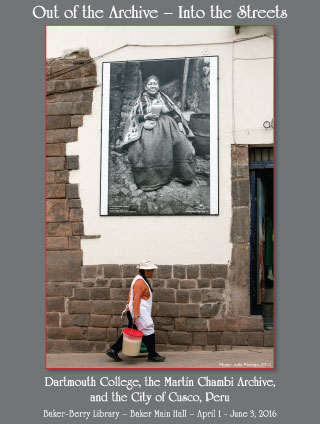
Martín Chambi (1891-1973) is one of Latin America’s most renowned photographers. A Quechua-speaking native born in a small village in the vicinity of Lake Titicaca, Chambi considered himself the “representative of his race” and aspired to capture the entire gamut of life in the southern Peruvian Andes. Critics celebrate his exquisite and dramatic photographs of Machu Picchu and other archaeological sites, as well as his photographic manipulation of light and chiaroscuro that have earned him the title “painter of light.”
The Martín Chambi Archive, in Cusco, Peru, holds more than 35,000 of the photographer’s glass plates, which document the modernization and radical transformation of the region. His images include the arrival of the first cars, the devastating earthquake of 1950, and members of all classes of society, from the chichera to the city’s elites.
A Dartmouth – Martín Chambi Archive Collaboration
This Library exhibit, Out of the Archives – Into the Streets, showcases
Professor Silvia Spitta’s two-year collaboration with the Martín Chambi Archive. Thanks to a Dean of the Faculty Scholarly Innovation Grant, the project enabled the digitization of thousands of previously unseen glass plates, culminating with the city-wide exhibit El Cusco de Martín Chambi, in which thirty-two of Chambi’s iconic images were enlarged and set up in the streets. Argentine photographer Julio Pantoja documented the exhibit with the photographs included in this exhibit.
The El Cusco de Martín Chambi exhibit underscored the importance —and the potential—of the archive as a source of cultural heritage, memory, and, ultimately, community.
Out of the Archives - Into the Streets, curated by Professor Silvia Spitta, Jill Baron, and Dennis Grady, is offered in conjunction with Out of the Archive: Photography, Patrimony, and Performance in Latin America, an international conference generously sponsored by the Leslie Humanities Center, the Department of Spanish and Portuguese, the Associate Dean of the Arts and Humanities, the Hood Museum of Art, and the Native American Studies Program, April 14-15, 2016. Exhibit design by Dennis Grady.
Baker-Berry Library, Baker Main Hall: April 1 - June 3, 2016
Reading the Revolution - Late 20th Century Chinese Graphic Novels
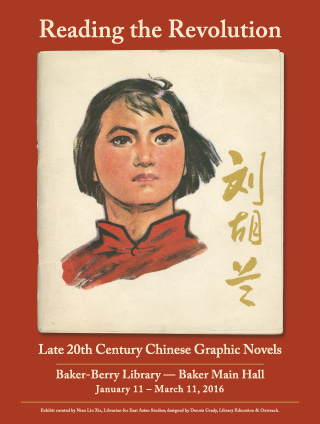
Chinese graphic novels were first published in the 1920s. The popularity of these novels rose in the 1950s and peaked in late 1960s and 1970s, but continued to be published until the 1990s. During the 1960s and 1970s, when the Cultural Revolution swept throughout China, schools were closed and books were destroyed. For years, Mao Zedong’s writings, such as Quotations from Chairman Mao Tse-tung (“Little Red Book”), became the predominant reading materials in China. Under these peculiar historical circumstances, graphic novels became a major educational tool and source of entertainment for young people, especially children. As most families lacked the financial resources to purchase them for their children, most obtained the books by renting. Book stalls offered long benches and stools for children to sit and read. The typical cost for renting a single volume was a penny or two.
It is not an exaggeration to say that graphic novels were indispensable to a Chinese generation growing up during the 1950s and 1960s. Many children spent hours of their daily life reading them throughout their childhood.
During a time when political turmoil prevailed and cultural heritage deteriorated, graphic novels, through vivid images and colorful storytelling, encouraged children’s imagination, gave them an alternative to heavily political materials and enriched their primary education.
Since 2014, the Dartmouth College Library has selectively collected over a dozen titles of Chinese graphic novels ranging from 1957-1989 with the majority published in the 1970’s. The examples in this exhibit provide some insight into how millions of Chinese school aged children were educating themselves in the midst of political turmoil during the Cultural Revolution. In addition, they provide readers a glimpse of what life was like under the circumstances and serve as a testimony to the impacts these movements brought to people and society.
Reading the Revolution: Late 20th Century Chinese Graphic Novels was curated by Nien Lin Xie, Librarian for East Asian Studies; design by Dennis Grady, Library Education and Outreach.
Baker-Berry Library, Baker Main Hall: January 11 - March 11, 2016
A Lot of Good This Daylight's Gonna Do Us - Cult Cinema from 1968 to 1988: Three Directors
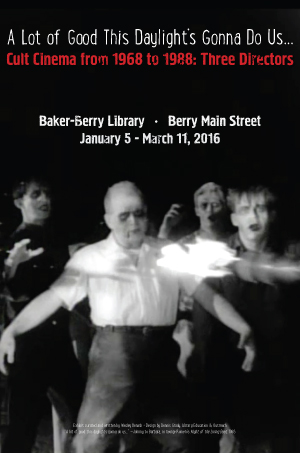
A Lot of Good This Daylight's Gonna Do Us - Cult Cinema from 1968 to 1988: Three Directors examines the work of John Carpenter, David Cronenberg, and George Romero within their larger cultural context. Curator Wesley Benash explains his long-standing interest in the subject:
"When I was six years old, by father let me rent Brian De Palma’s film Carrie from the video store. It scared the hell out of me, but it also spawned a lifelong fascination with the shadowy, macabre underbelly of the cinema. As a young boy and teenager, I was interested in these films for their sensational elements –violence, gore, and sex. As I grew up, I began to appreciate them for their sociopolitical elements instead, and I came to understand how less reputable forms of cinema, such as the horror film and exploitation film, frequently had much to say about the societies in which they were produced. As a student, I have parlayed this interest in cult film into scholarship; the admiration and appreciation I have for these films serves as the backbone of the thesis I am writing in Dartmouth’s Master of Arts in Liberal Studies program.
"The films on display, and others like them, tend to function as cinema’s id, forcing us to acknowledge the ugliness within society and within ourselves; it is for this reason that they repulse so many viewers. But for those who are willing to open their minds to these films, they are equally audacious and enlightening.
"I obsessively watched the works of John Carpenter, David Cronenberg, and George Romero as a boy and teenager. I think they are great artists and that their best work stands up to the finest products of Hollywood, Italian neorealism, the French New Wave, or any other period in cinema history. It is my hope that upon viewing their work, you will feel the same."
Exhibit curated by Wesley Benash; design by Dennis Grady, Library Education and Outreach.
Baker-Berry Library, Berry Main Street: January 5 - March 11, 2016
Christian Wolff: beginning anew with every ending
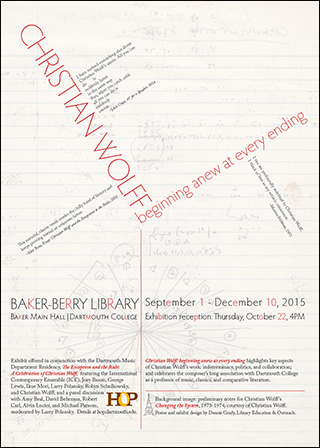
By the time he came to Dartmouth to teach Classics, Comparative Literature, and Music in 1971, Christian Wolff was already a world-renowned composer, as a member of the “New York School” of American composers with John Cage, Morton Feldman, Earle Brown, and David Tudor. He had played a key role in the revolution in music composition at mid-century when, at the age of 16, he gave a copy of The I Ching – or Book of Changes to his new-found composition teacher, John Cage. Cage had been searching for a way to rescue his music from his own preconceptions, aesthetic habits, and learned musical expectations. The I Ching provided a way, through the introduction of chance procedures into the process of composing music, for Cage to remove his own preferences from the process. As Kay Larson notes in Where the Heart Beats–John Cage, Zen Buddhism, and the Inner Life of Artists (NY: Penguin Press, 2012), “Christian’s gift of The I Ching—like a blessing that could never have been anticipated—made the revolution possible.”
This exhibit highlights key aspects of Christian Wolff’s works: indeterminacy, politics and collaboration; and celebrates the composer’s long association with Dartmouth College as a professor of music, classics and comparative literature. It is offered in conjunction with The Exception and the Rule: a Celebration of Christian Wolff Featuring International Contemporary Ensemble (Ice).
Exhibit curated and designed by Dennis Grady, with help from Pat Fisken, Head of Paddock Music Library; Joy Weale, Music Library Supervisor; Deborah Howe, Dartmouth Library Collections Conservator; Meghan Grela ’17; Reid Watson ’16; and Prajeet Bajpai ’16. Many thanks to Margaret Lawrence, Director of Programming at the Hopkins Center, for suggesting a Library exhibit to complement the Hopkins Center’s program, The Exception and the Rule: A Celebration of Christian Wolff; to Alvin Lucier and Amy Beal for permission to use their insightful published writings; to Stephanie Berger and Gordon Mumma for their photographs; and most of all, of course, to Christian Wolff for his astonishing music and for his many generous contributions to this exhibit.
Baker-Berry Library, Baker Main Hall: September 18 - December 10, 2015
Exhibit reception: Thursday, October 22, 4PM.
Prepare Your Skeleton for the Air - Surrealism and the Spanish Avant-Garde in the Dartmouth College Library
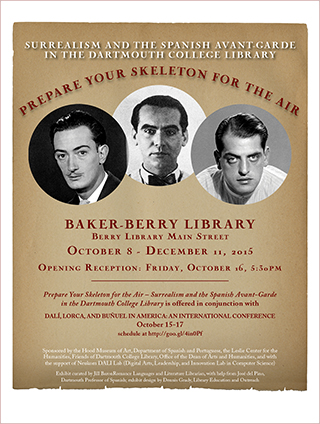
Prepare Your Skeleton for the Air: Surrealism and the Spanish Avant-Garde in the Dartmouth College Library coincides with the Department of Spanish & Portuguese conference “Dalí, Lorca & Buñuel in America,” October 15-17, 2015. The exhibit features materials from the Dartmouth Library’s collections that display the influence of surrealism on the work of Salvador Dalí (1904-1989), Federico García Lorca (1898-1936), and Luis Buñuel (1900-1983).
Our exhibit title, “Prepare Your Skeleton for the Air,” is from Federico Garcia Lorca’s poem “Ruin,” in his Poeta en Nueva York collection. The poem ends with these two stanzas:
Tú solo y yo quedamos.
Prepara tu esqueleto para el aire.
Yo solo y tú quedamos.
Prepara tu esqueleto.
Hay que buscar de prisa, amor, de prisa,
nuestro perfil sin sueño.
------
You alone and I remain.
Prepare your skeleton for the air.
I alone and you remain.
Prepare your skeleton.
One must look quickly, love, quickly,
for our profile without sleep.
Exhibit curated by Jill Baron, Romance Languages and Literature Librarian, with help from José del Pino, Dartmouth Professor of Spanish; design by Dennis Grady, Library Education and Outreach; document and book preparation by Deborah Howe, Library Collections Conservator.
Baker-Berry Library, Berry Main Street: October 8 - December 11, 2015
Exhibit reception: Friday, October 16, 5:30PM.
Student Library Service Bookplate Program
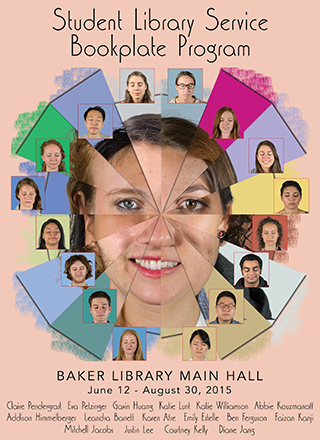
Dartmouth Class of 2015
The Student Library Service Bookplate Program honors the Library’s graduating student employees by inviting them to choose books and other items for the Library’s collections. Each item will receive a bookplate that acknowledges the student’s selection and honors his or her service to the Library. Students are eligible if they worked at least two terms in any Library department (including RWIT, The Student Center for Research, Writing and Information Technology).
The Library is honoring over fifty students from the class of 2015 with selections ranging from world fiction, cookbooks, and DVDs to children’s books, inspirational works, and historical scholarship. This exhibit features sixteen students who have volunteered to share their thoughts with the Dartmouth community.
Baker-Berry Library / Baker Main Hall: June 12 - August 30, 2015
Exhibit design and photography by Dennis Grady, Library Education & Outreach. Many thanks to the students and interns who volunteered to participate in this exhibit, and to Greg Potter, Research and Information Desk Coordinator, for his organizational help.
This year's exhibit participants:
Karen Afre, Leandra Barrett, Emily Estelle, Ben Ferguson, Addison Himmelberger, Gavin Huang, Mitchell Jacobs, Diane Jang, Faizan Kanji, Courtney Kelly, Abbie Kouzmanoff, Justin Lee, Katie Lunt, Claire Pendergrast, Eva Petzinger, and Katie Williamson.
Geographies: New England Book Work
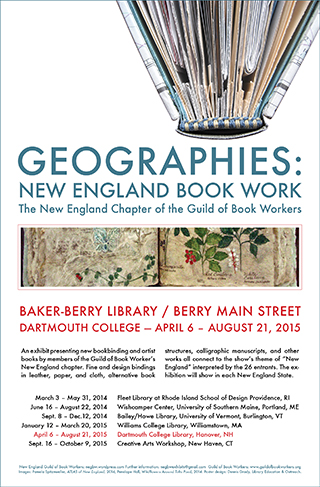
The New England Chapter of The Guild of Book Workers
This exhibition displays a wide range of work from the members of the Guild of Book Workers’ New England chapter. The pieces relate to the show’s theme of New England, with entrants interpreting that theme as they wished. The 26 works in this exhibition span a range of contemporary book work— fine and design bindings, traditional and creative bookbinding, artist books and calligraphic manuscripts, and incorporate a variety of materials and production methods. Some members have created both the content and structure, while others have used an existing text as the basis for their work.
The Guild of Book Workers is a national organization founded in 1906 that brings together people involved in all the book arts. The New England Chapter, one of ten regional chapters with 180 members, organizes programs within the region, such as lectures, workshops, and exhibitions.
Many thanks to Jay Satterfield for his help in choosing some related items from the Rauner Special Collections Library to exhibit at this venue alongside the NEGBW show. Thanks also to Deborah Howe, Tessa Gadomski, and Dennis Grady for their assistance. Exhibition curated by Stephanie Wolff, Preservation Services, Dartmouth College Library and NEGBW Exhibitions Coordinator.
Baker-Berry Library / Berry Main Street: April 6 - August 21, 2015
The Secret Revealed - The Book Arts Workshop at 25 Years
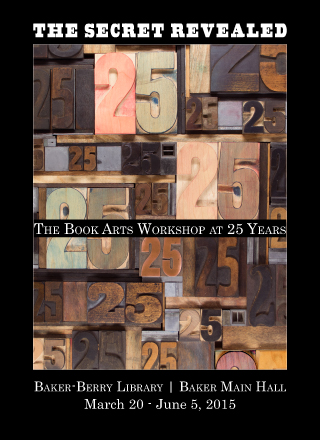
Often called Dartmouth’s best-kept secret the Book Arts Workshop in Baker Library is celebrating its 25th anniversary. Created in 1989-1990 by Edward Connery Lathem, '51, Rocky Stinehour, '50, and Mark Lansburgh, '49, three former students of Professor Emeritus Ray Nash, the studio is located in the former location of Nash’s Graphic Arts Program, Baker Library Room 21-23. From its early beginnings of letterpress instruction the workshop has grown to include bookbinding and curricular support of the arts of the book.
Baker-Berry Library / Baker Main Hall: March 20 - June 5, 2015
Curated by Barbara R. Sagraves, Preservation Services, and Sarah Smith, Book Arts Workshop. Designed by Dennis Grady, Library Education & Outreach. Materials preparation by Pat Cope and Phyllis Gilbert, Rauner Special Collections Library, and Deborah Howe and Stephanie Wolff, Preservation Services. Special thanks to Jay Satterfield, Rauner Special Collections Library, and Jeff Horrell, Dartmouth College Libraries, for their invaluable suggestions.
The Design Work of Alvin Eisenman '43
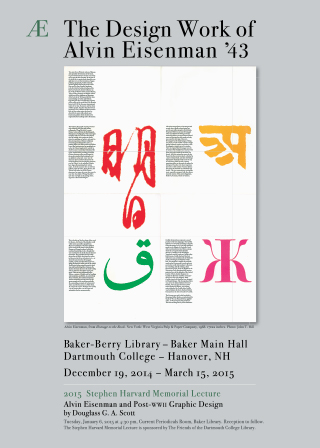
The design work of the long-time director of the first graduate program in graphic design in America.
This exhibition highlights Alvin Eisenman's design work before and during his career as a design educator at the Yale School of Art for over 40 years. For a better understanding of the sources and influences that led to the creation of the seminal academic program in graphic design in America, this show includes some of Eisenman's earlier and lesser-known works. The exhibit also serves to display the role and range of a professional book designer. Included below is a link to a video tribute to Eisenman by his former student, Garson Yu.
In conjunction with this exhibition, this year's Stephen Harvard Memorial Lecture featured a talk by Douglass Scott on Eisenman's role in the rise of the modern graphic design profession in the post-WWII era. Scott, a former student and teaching colleague of Eisenman at Yale, is a designer, design educator, and former creative director at WGBH, the PBS affiliate in Boston. The talk was sponsored by The Friends of the Dartmouth College Library.
Exhibition curated by Won K. Chung ’73 and based on an earlier exhibit by John T. Hill. Exhibit design by Dennis Grady, Library Education & Outreach. Photographs by John Hill. Special thanks to Sara Eisenman and the Eisenman family, and to Thomas Strong ’60 for their assistance and loan of materials.
Baker-Berry Library / Baker Main Hall: December 19, 2014-March 15, 2015
[Image: Broadside, 17" x 22", designed by Alvin Eisenman as part of the portfolio, Homage to the Book, New York: West Virginia Pulp & Paper Company, 1968. Rauner Library collection.]
Alvin Eisenman - A Video Tribute by Garson Yu
Meet DALI
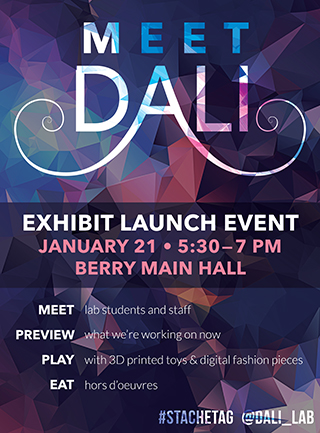
The Neukom DALI Lab was founded in April 2013. This exhibition highlights some of the amazing work students have done in the lab since.
Exhibition curation and design by Runi Goswami ‘13 MS ’15. Videos by Delainey Ackerman ‘15, Jake Gaba ’16, and Nook Harquail ‘14 MS ’15. Mechanical gear wall by Luke Zirngibl ‘14 MS ’15.
Installed by Marissa Allen ‘14 MS ’15, Runi Goswami ‘13 MS ’15, Nook Harquail ‘14 MS ’15, Malika Khurana ‘15, Ryan Smith '14, and Tim Tregubov ’11 MS’15.
Baker-Berry Library / Berry Main Street: January 21 - March 31, 2015
For more information on the Neukom DALI Lab, visit https://dali.dartmouth.edu/
The Grassy Knoll Revisited - On the Fiftieth Anniversary of the Assassination of President John F. Kennedy
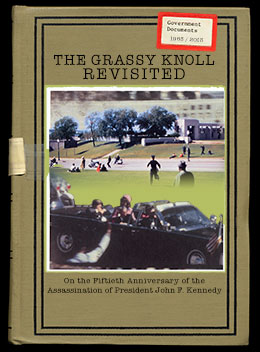
Fifty years after the fact, the facts themselves, filtered and funneled into diverse theories, have persisted in various permutations without ever reaching a final denouement. The Warren Commission, convened by Lyndon Johnson days after the assassination, issued its non-conspiracy theory less than a year later in 26 volumes of testimony and exhibits and the 888-page Report of the President's Commission on the Assassination of President John F. Kennedy. The Commission's conclusion, that Lee Harvey Oswald acted alone, has been doubted and disputed since the day it was issued.
This exhibit surveys many of the holdings of Baker-Berry and Rauner Libraries that pertain to the assassination, and includes the digital forensic analysis of the famous Oswald backyard photo presented by Dartmouth Professor Hany Farid.
The Grassy Knoll Revisited - On the Fiftieth Anniversary of the Assassination of President John F. Kennedy was curated and designed by Dennis Grady. Video editing by Carla Galarza, Jones Memorial Digital Media Intern.
Berry Main Street, Baker-Berry Library, September 25 - December 20, 2013
